#thai bl analysis
Text
The politics of "Never Let Me Go"
What prompted me to finally watch the series “Never Let Me Go” was seeing a specific scene from the series. It’s the scene on the beach, where Nuengdiao is yelling at Palm about them being from different classes, different societies etc. This caught my attention as something that could have some aspect of political commentary. I didn’t expect it, but I hoped for it. Especially as I kept on seeing opportunities for this commentary to occur while watching the show.
Disclaimer: I know that this show utilises a lot of lakorn tropes and isn’t necessarily meant as political commentary, but I still feel that it is relevant to investigate the politics of the media that we consume. Also, I don’t understand Thai and therefore do not have knowledge on the actual meaning of subtitles I’ve quoted or much knowledge on the culture.
To go back to the beach scene that I just mentioned; I was baffled to actually watch the context of it. When I first saw it on social media, I thought it would have been a sad speech made in a time of hardship, especially for Nuengdiao. Actually watching it, however, it was a moment where Palm made the slightest rejection of Nuengdiao, pushing him away whilst he was grieving the death of his mother. This was the first time Palm had in any way been disrespectful to Nuengdiao and it was in every way justified given the context. However, this grasp for control in their relationship was entirely rejected by Nuengdiao and what had previously seemed to me as a heartfelt speech was suddenly not only an immature and disproportionate temper tantrum, but an attempt at oppressing Palm even further. Know your place. Although Nuengdiao never says it and frequently tries to convey the opposite, the message shines clearly through much of the show: If you’re poor, know your place. If you’re rich you can do whatever. This is especially illustrated in the contrast not only between Nuengdiao and Palm, but also between Palm and Phum, the bully. Nuengdiao, as I’m sure we are all aware, has a bit of a temper and is frequently controlled by his emotions. This is contrasted by Palm, who is very controlled and can even be described as obedient in most situations. As I just mentioned, whenever Palm tries to break away from this obedience, he is immediately knocked down by either an emotional story from his father or a bunch of mean-spirited yelling from Nuengdiao.
Nuengdiao is being empathised with by the show. An example of this is when Palm has a conversation with the woman who cooks Nuengdiao’s breakfast and Palm mentions that the amount of food being cooked is exaggerated. We might initially think that this is because Nuengdiao is spoiled, but when Palm goes to speak with him, he complains that the cook insists on cooking too much food for him. After this, Palm’s father is the one to say that Palm shouldn’t eat with Nuengdiao, not Nuengdiao himself. The inequality between Nuengdiao and the workers is therefore blamed on the working class more so than on Nuengdiao, Nuengdiao’s parents or the economic system. Palm is also sympathised with, but I would argue that this is only because of his forementioned obedience. Palm is an empathetic character because he respects the wealthy and is willing to sacrifice himself for their well-being. When he is not keeping an eye on Nuengdiao’s alcohol consumption at a party, he is punished. A similar situation is when Palm pushes Nuengdiao at the beach. Palm lacks the self respect to ever really hold Nuengdiao accountable for his actions, which I feel bleeds into the opinion of the overall show. He also falls in love with Nuengdiao very quickly and gets a tattoo of his name after them having been together for maybe a few weeks, at most a few months. I think it’s supposed to be romantic, but in reality it’s really just bad writing. For the most part Palm plays the part of the Good Poor Person and when he doesn’t, he’s put in his place. The Bad Poor Person contrasting Palm is Phum (although I’m not entirely sure he’s poor since he’s at the school and he has the money to pay for the outing video, but I think that his experience with his dad and his anti-capitalist politics code him as poor or at least not wealthy). Phum is a character that, like Nuengdiao, is very controlled by his emotions. He starts bullying Nuengdiao when Nuengdiao’s mother’s new decisions at the family company affect his family’s (and others’) finances so much that his father attempts suicide. This is obviously a deeply traumatising thing to experience for a young man and whilst the bullying is not justified, it makes sense that he would do some of the bullying that he starts out with, e.g. putting the “cheater” graffiti and flyers on Nuengdiao’s locker and stealing the necklace that is connected to Nuengdiao’s father and Nuengdiao’s position in the company. The outing, which is arguably the worst thing he does, doesn’t happen until after he is confronted about the bullying in episode 3. This confrontation scene is complicated because Phum is not in the right here, but neither is Nuengdiao, although he is portrayed as a saint for only asking for his necklace back. Phum explains his reasons for the bullying and the very sensitive information that his father tried to kill himself because of what Nuengdiao’s parents did, yet Nuengdiao shows no regret, sympathy, self-reflection or apologeticness. I’ll say it again: Phum was not right in his aggressive manner of handling the situation, but Nuengdiao’s continuous lack of sympathy for the lives of people less fortunate than him is similarly despicable although it is not portrayed as such. When confronted about the bullying, Phum also says that he’s doing it because of Nuengdiao’s “capitalist parents” (EP 3). I think this illustrates that the villains of the show are people who do not respect Nuengdiao’s family’s authority. Anti-capitalists are necessarily the villains of the series because our protagonist and hero is the heir of one of the biggest capitalist companies in this fictional version of Thailand. The heroes are cheating, evicting and causing people so much financial insecurity that they attempt suicide. Of course anti-capitalists, leftists and poor people would function as the villains in this scenario.
Similarly to the Good and Bad Poor Person, the show also has Good and Bad Capitalists. Nuengdiao and Chopper are the Good Capitalists. Nuengdiao finally does something about the protests in EP11, where he goes to the poor people at the market. He is met by banners with messages such as “the market belongs to everyone” and “give the land back to us.” He doesn’t give the land to them, but he does announce that he is going to let them keep using it. We never see their reactions to this. Nuengdiao also stops a casino from being built at the hotel because it is illegal and interestingly mentions in EP11 that illegal business is already taking place at his company, but that he is going to end it. Once again, the morality of his parents, who most likely implemented this illegal business, is never questioned. The show even has themes of having to choose between what is right and one’s parents with Chopper and his father, but the show never dares to extend this questioning onto Nuengdiao and his parents. Chopper is also a Good Capitalist because he makes his own money through stocks and other supposedly fair methods and he keeps saying to his father that he wants to make his own money. The villain of the show (his father) points out to him that it’s not very easy to make your own money, which is true although it obviously doesn’t mean that what he is doing is right. We never really see anyone struggling with money, except the villains (and a flashback of Palm’s father) because the Good Poor People are loyal to their employers and don’t expect anything more than what they get. Chopper’s father is the villain because he is disloyal to Nuengdiao’s family and wants to cheat his way to something that isn’t rightfully his. It is rightfully Nuengdiao’s because… well, it’s his birthright.
Honestly, I found that "Never Let Me Go" is quite poorly written and the use of lakorn tropes might have been what led to the questionable politics of the show as well as the fact that Nuengdiao’s father originally was supposed to be a mafia boss (or so I’ve heard). In many ways I think "Never Let Me Go" contrasts "Not Me" with its complete lack of class consciousness and self reflection for our main character, which is unfortunate because it could have had such interesting political commentary. If only the writers had been willing to give their characters - both pro- and antagonists - some more depth.
#gee this was a long one#never let me go#never let me go the series#not me#not me the series#politics in thai bl#jojo tichakorn#politics#politics in media#my post#thai bl#thai bl analysis#analysis
2 notes
·
View notes
Text
The most fascinating part of Deep Magenta to me is that there is a definitive split in the analysis I'm seeing and it's a split right down the middle on Puen's motivation and it's very interesting to watch the different takes and how people are interpreting scenes based on our distinct lack of knowledge about him.
Now, magenta is described as a balance of red and violet so I'm going to label the two sides that way.
Red is about passion and that passion side, the red side, views Puen as experimenting. He's learning this new life, this new freedom. He means none of this deliberately and is being wholly honest at the end when he says he means it. These are people who truly believe that Puen already cares for Talay and is expressing it badly or insincerely but truly means best and is just trying to be his best. They are all certain that what we're seeing in the real Puen, no shields or fakery, and that his lying is about his name and his identity in the real world, not about his feelings in this one.
Violet is about introspection and quiet and a lot of the violet side is about Puen hiding himself. That the love he's expressing to Talay is part of an experiment that he is deliberately acting on. That Puen is trying to shape his relationship to Talay in a specific and chosen manner in order to gain something, whether it's because he believes that need to be in love to be portkeys and get back to their own universe or it's a just to experience love without the consequences of his real life. Either way, this is about Puen lying about more than his name and his alternate identity, it's about Puen using Talay on a much deeper level.
Now, neither of these sides is right yet. We don't know. But I find it interesting that an episode about a color that doesn't exist as a measurable wavelength of light brought out these opposing viewpoints and analysis.
#deep magenta#vice versa#vice versa the series#vice versa series#thai drama#thaibl#thai series#bl series#bl drama#thai bl#gmmtv#thai bl meta#thai bl analysis#let me read too much into everything#including fan reaction
32 notes
·
View notes
Text



This scene was so significant and I haven't seen anyone talk about it. Sand knows about Ray's excessive drinking but not how bad it really is. In this moment he begins to understand. The brilliance of Sand immediately stopping while pouring the drink when Ray said that his mother drank herself to death. There was more than simple shock about this revelation. It was the realisation that Ray is doing the same. Sand looks at Ray and back at the alcohol because he understands so much more than what Ray said. He sees that Ray is in so much pain and tries to drown it all out in alcohol. Sand sees how Ray's immediate reaction to the fight with Boston is to open the liquor bottle.
#only friends the series#ofts#oftsedit#sandray#raysand#firstkhao#khaofirst#khaotung thanawat#first kanaphan#gmm tv#thai bl#ofts analysis
644 notes
·
View notes
Text
I just wanna have a brief discussion about 2 BL actors right now:

Bright Rapheephong Thapsuwan - Yai in I Feel You Linger in the Air

Lee Ye Hwan - Kim Ji Oh in Why R U? (Korea - the Saifah character)
Look I talk about acting style lot, especially around chemistry. So if you're watching these two shows here's something:
Bright does 90% of his acting with his eyes. His eye work is INSANE. You can see just from the way he looks and Jom how much Yai likes him (and wants him). It's pretty flipping cool. This is relatively rare out of Thailand, another actor who does this in Nanon.
Lee Ye Hwan does 90% of his acting with his body. He is super physically aware of space and proximity, which is very very rare from Korean talent. You can see in the way he moves, tilts his head, his hand gestures, breath matching and leaning in, how much Ji Oh likes/wants Lee Won.
It's just really cool to have two such clear examples of acting styles that are in contrast to the other actors surrounding them in their respective shows.
So I just thought, if you're watching these 2 shows, I'd point it out and use them as teaching tools for these two different acting styles.
450 notes
·
View notes
Text
The tags left under my review of first ep of WG by @italianpersonwithashippersheart inspired me to write about what I immediately thought about Dee: this boy is inexperienced when it comes to sex (although I don't think he's a "novice" in this matter) and he draws on all his knowledge - despite this that he's a doctor 😭 - from, um, pop culture? 😂 His behavior indicates that he's under the influence of a mixture of music videos of modern female rappers, old-fashioned porn watched secretly during his adolescence years and BL series (he wiped the food off my mouth = clearly it's love), because if not, the poor guy has watched hair metal bands from 80's, because of the way he draped himself over the door in this scene
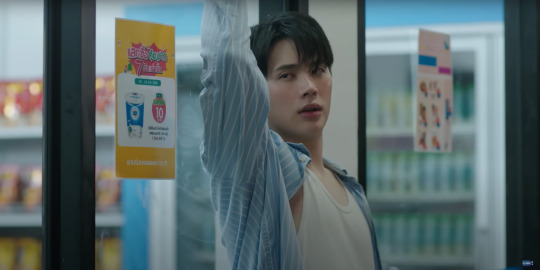
honey, you're not the hot girl from the Whitesnake MV! 😭
Dee is inexperienced, or very naive with a touch of delulu, and despite everything, childish in these matters (sorry, I will insist on this 😘). Because Kao somehow managed to flawlessly point out the loopholes in Dee's reasoning, tried to help him and warned him many times, and he also leads a conscious love life himself - and they're both of a similar age!
How clueless Dee is when it comes to matters of sex is proven by the fact that what he took away from the whole conversation with Ter was not that he didn't like him "like that" and that Ter was straight, but that he, Dee, was vanilla 😭
That's why I'm curious whether Dee will be shown as someone who has had sexual partners before but still has no actual experience, or whether he "saved himself for Ter for 8 years". And how his "sexual journey" will unfold with the right partner 😚
#wandee goodday#thai bl#bl drama#I don't know why I'm doing this analysis#it's all probably not that deep and it's just a comedy 😅#I just somehow noticed it because Dee is so childish when it comes to this#compared to how grown up he is in other scenes#and compared to Kao AND even to Yak
75 notes
·
View notes
Text
Body Language in Cooking Crush
Saw a great discussion about Dynamite and Fire in Cooking Crush unfold last night on my dash, (have I mentioned I love my mutuals?) and have not been able to stop thinking about what @twig-tea was saying in their post about body language, nuance, and consent and how Dynamite is constantly and carefully reading the room. And you know when someone says body language, WKA shall appear to do a scene break down!
I want to start, briefly, by reiterating the fact that Dy’s crush on Fire started after Fire intervened in his bashing, literally grappling and throwing one of the two bullies to the ground. So one of the very first things Dy ever learns about Fire is that he a) is kind enough to step in when he sees someone being hurt and b) will throw hands if he needs to. And Dy uses these two pieces of knowledge to gauge how he interacts with Fire as he begins his pursuit.
First Encounter
The first interaction we see, Dy comes out swinging right out the gate, he is explicit in his queerness, up front about his feelings, and obviously in pursuit.
Fire makes immediate eye contact with him, thanks him for the drink, and then proceeds to disengage from the conversation. But, remember, Dy knows Fire is kind and knows Fire can get physical, so he’s on a safe track so far, there is no harm in introducing himself. “Your name is Fire. My name is Dynamite. We know each other now.”

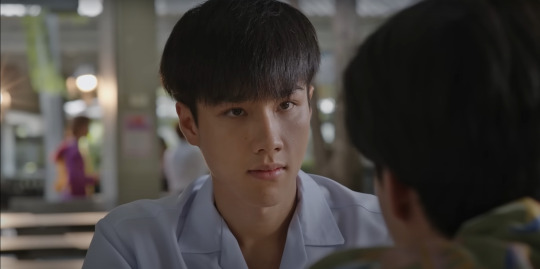
Something in Fire’s face softens, and where just a second ago he was completely disinterested and disengaged from Dy, now he is tuned in. But he catches himself quickly, almost immediately puts his mask back on, and gets the hell out of dodge. Dy presses a bit more and Fire gives him a fake smile that drops in to a frown. Fire isn’t angry here, he’s just annoyed. Which is fine, because Dynamite is intentionally being annoying, and he does chase after Fire with his drink, but he doesn’t try to keep Fire in place, he doesn’t touch him, he doesn’t grab him, he waits a moment (enough time for Fire to actually put some distance between them) before he follows after. What has Dy learned? Fire isn’t homophobic (at least to the point of violence) and there was the tiniest flicker of interest. He can keep on his pursuit.
This is followed by Dynamite placing himself in front of Fire’s line of sight on Jane, to Fire’s annoyance, yes, but I think it is important to note that Fire has no issues with touching Dynamite gently despite his very open queerness, FIre maintains the conversation, and even relies on Dynamite to get Jane’s number. When Fire calls Jane later and finds Dynamite on the other end of the phone, he’s once again frustrated and annoyed, but he doesn’t hang up the phone and he doesn’t balk at being called cute by Dynamite either. He isn’t mad about being flirted with by a guy, he’s mad that Dynamite played him and he didn’t get to talk to Jane.
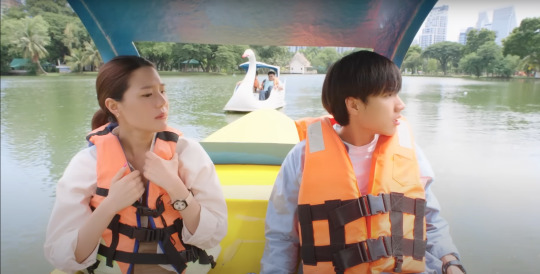
And while Dynamite has fun annoying Fire, he isn’t an asshole either. He doesn’t let Fire immediately revel in connection with Jane, because Fire couldn’t work up the courage to ask her himself, but he also will not deny Fire his actual chance to pursue what could be genuine feelings for Jane, so he gives Fire her number the very next day. On his date with Jane, Fire spends the entire time looking for Dynamite, completely ignoring Jane at his side. Dy is correct, if Fire was actually interested in Jane it wouldn’t have mattered.
Kabedon
Fire pins Dynamite to a wall to interrogate him about his presence in the area during Fire’s date. But the way Fire is looking at Dynamite is not anger, it’s a challenge.

gif by @gunsatthaphan
And when Dynamite remains unphased, you can see that challenge fading almost immediately in to annoyance, and then…Dynamite squares his shoulders, takes the smallest step forward, accepts Fire’s challenge and...
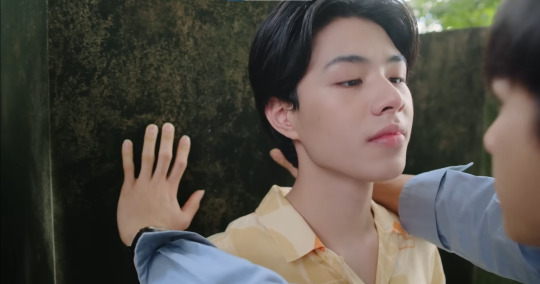
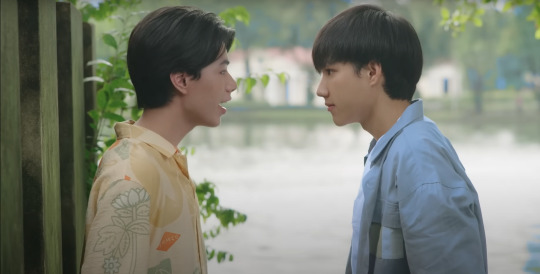
Fire retreats, not far, but he does drop his hands, he does take a step back, he cedes territory, he…he submits. And not only does he do so, but he gives Dynamite a once over, and when Dynamite keeps flirting, and Fire does not reciprocate, Dynamite says he will just go somewhere else if Fire is bothered, but offering the observation to Fy that he hasn’t been paying attention to Jane. Here again Fire could have gotten aggressive or could have walked away, but instead he grabs Dynamite’s hand and presses them to Dy’s lips to shush him. Which is exactly the opposite thing you want to do if you are trying to discourage the boy who is clearly comfortable being pinned between your arms from pursuing you any further.
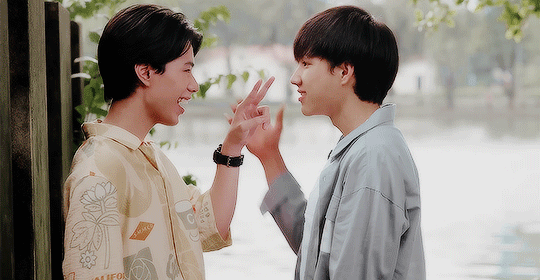
gif by @gunsatthaphan
And as Twig mentioned, the nuance in the body language here is that Fire is annoyed, but not upset. Fire is annoyed, but not angry. Dynamite leaves Fire alone for the rest of his time with Jane, and Fire sits beside her thinking about Dynamite instead. And there are clearly positive feelings for Dy taking root in Fire after this interaction, because this is what Fire’s reaction is when he thinks of Dynamite.
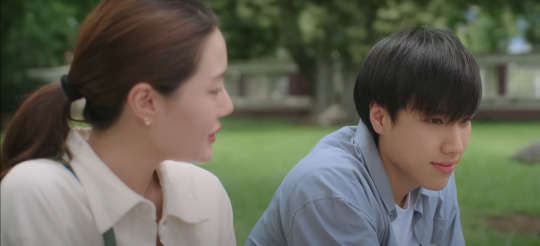
It's small, it's subtle, it's hard to see with a static photo, but he's got the barest trace of a smile on his face.
And Dynamite knows when to pull back, too. When Fire threatens to punch Samsee and is physically restrained by Metha, Dynamite leaves immediately and does not appear in front of Fire again until he takes the fall for Fire in front of his mother. And thus starts the shift in Fire’s interactions with Dynamite with the peace offering of soy milk, where Fire makes moon eyes at Dy for the entire scene.
Questioning in the Car
After being dumped by Jane, and starting to recognize he is having some sort of feelings for Dynamite, Metha (my beloved) takes Fire to acquire a sex worker and see how he feels about engaging in sex when a second penis is involved. And just like moving in to the same apartment complex was a coincidence, so too is Dynamite and Fire running in to each other on the street here.
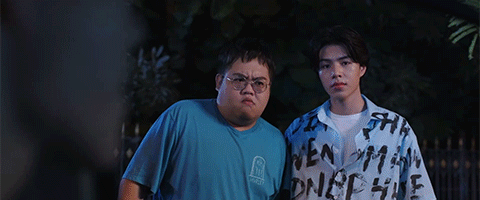
gif by @save-the-data
Metha rolls down the window to start a conversation. Now. In my view, dynamite has always been paying attention to Fire’s reactions to his advances. But if that was not made super clear because Dy was being subtle about it at the beginning, it is made extremely obvious from every moment after the conversation on the fire escape. Because all Dynamite is doing from the second that Fire comes in to view is staring at him. Hearing Metha ask if they are using the sex worker service too and then watching intently as Dynamite’s eyes flit from Samsee, to Dynamite, down at the ground, and then straight ahead refusing to make more eye contact because Fire is embarrassed. Because he has realized he has some sort of feelings for Dynamite and he has been caught trying to figure out what those feelings are by the very person that has thrown his sexuality in to question in the first place.
And that trend continues when they are alone in the car. Dynamite might be in the backseat, but his eyes are trained on Fire’s face for the entire conversation. Body language and consent here, right? Fire is not comfortable being in this car with Dynamite, but again not because Dynamite is doing something to upset him, because he knows that being caught this way gives a pretty clear sign to Dynamite that Fire has feelings for him. But at this point Fire is a coward and Dynamite is brave, so he will initiate the hard and awkward conversation that needs to be had.
“Since I told you I like you, it made you feel uneasy, right?”
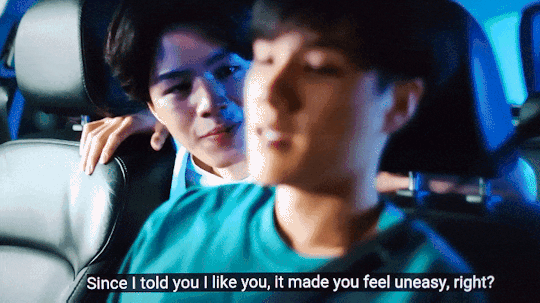
gif by @sidecouplesupremacy-blbambeyond
Boom. Called out about it, Fire for the first time since that initial moment of recognition turns to look at Dy. Now, the audience gets a good auditory confirmation that Fire is experiencing feelings, because we hear the heart beat sound effect. But Dy gets a confirmation too, because Fire’s mouth is slightly open, Fire’s brow furrows for just a moment. It’s hard to see it from the angle Neo’s head is at, but Fire is scanning Dynamite’s face, and he breaks eye contact when the feelings get to be too much for him.
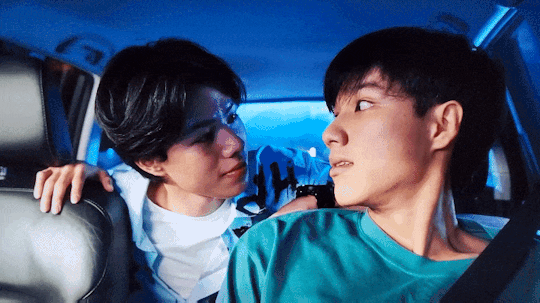
gif by @sidecouplesupremacy-blbambeyond
By Dy won’t let him run away. Dynamite places a hand atop Fire’s head (worth noting that heads, if I recall correctly, are pretty sacred in Thai culture and having someone touch your head holds some weight to it). Fire gets lost in Dynamite’s face for a moment, and takes a little too long to pull away from Dynamite’s touch for someone claiming not to like Dynamite. Again, Dy may be a little shit (read: someone who enjoys intentionally annoying people) but he is not an asshole, he knows this is getting to be too much for Fire, and he defuses the intensity of the moment by pushing harder on the “you like me” point, but in such a way that allows Fire to hide behind annoyance once again. But Dy still wants to be certain he is reading the situation correctly, so he leans in a little, a teasing distance and Fire?

gif by @sidecouplesupremacy-blbambeyond
Jaw goes slack, then tenses as he swallows hard, and his eyes flicker down for just a second right to Dynamite’s lips. Dynamite backs off, and the thrill of the moment finally settles over Fire now that he has some breathing room from the intensity of that interaction for him and he starts to smile to himself. With Dynamite once again checking Fire’s face to gauge his reaction, and only smiling when he sees Fire is melting in his seat.
Cold Shoulder at the Grocery Store
The audience does not know this yet, but Dynamite has suffered a massive loss for being queer, and that has made him brave and strong, and that has informed the way that he engages with potential lovers. I won’t talk about it at length because multiple other posts have already covered that. But I think it is important to remember for what comes next. Because Dynamite looks pretty happy after that conversation in the car that Fire reciprocates his feelings. And then he sees Jane and Fire together at the store.
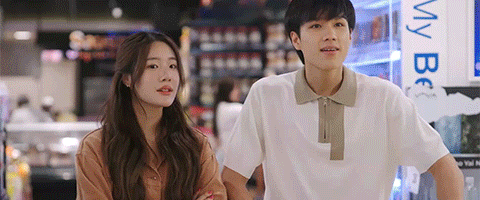
gif by @save-the-data
Dynamite sizes up the scene, sees Jane at Fire’s side, see’s Fire looking amped up and a little cocky, and you can see the moment he decides to shut his feelings for Fire down in the tiniest of lip movements. (Aungpao is blowing me away in this show, he’s seventeen fucking years old, his microexpression game is on point, he’s relatively green, and he’s keeping up with actors like GUN ATTAPHAN, OFF JUMPOL, AND NEO TRAI.) Dynamite is brave, but what he is seeing is Fire running from his feelings and trying to be straight, and for the time being, Fire is not strong enough for what comes next. Dynamite got his hopes up and they are being crushed in real time in the grocery store.


And when Dynamite does not engage, Fire doesn’t look relieved that he didn’t have to deal with Dynamite, he looked disappointed that Dynamite decided not to pay attention to him. To give him the space that he’s said he has wanted all this time. It takes Jane coming out about her relationship and calling Fire on his crush on Dynamite to corner Fire in such a way that he can’t run from his feelings anymore. But man oh man is he going to try.
Drunk Confessions


gifs by @gunsatthaphan
Dy is mad, trying to get past his feelings for Fy, and is now having to take care of a drunken man that is confessing his feelings because he is only able to do so under the influence. God I love this scene so much, because it is one of the rare times that I have seen a drunken kiss, and a chaste cheek kiss at that be so upsetting. And Dynamite has every right to be upset, a) because he might have pushed Fire around a bit, he definitely stepped over the line occasionally by following Fire around but he never was physically intimate with Fire and b) because Fire has jerked around Dynamite’s emotions partially without Fire’s knowledge, and you can see the mental calculus going on in Dy’s head when Fire kisses him, because this is a very blatant admission of feelings but not when he is sober, and that is wholly unfair to Dy.
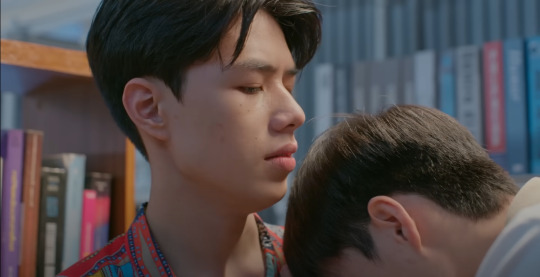
But it’s getting Dy’s hopes up too and you can see him shake his wall back in place after Fire collapses on his shoulder because he can’t afford for Fire to get sober and clam up again. And here we get the admission of exactly what Dy has been picking up on this whole time: “Regardless of how much I say I don’t want to see you, you have no right to walk away.” To be clear here: this is not a ‘no means yes’ situation. This is a “you don’t have to stop” admission a la Secret Crush on You. Fire likes the game and is saying so himself right now. It’s why Dy picked up on from the beginning and why he was acting the way that he was, and seeing Fy with Jane after their conversation in the car is when he think he might have been misreading Fy the entire time and pulls away completely out of respect for the feelings of everyone involved.

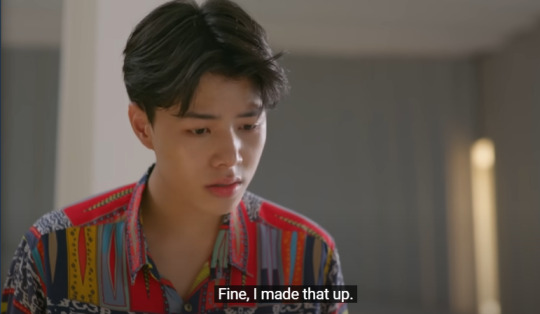
Which is why Dy pulls away even harder and stops engaging with Fy at all after Fy wakes up sober, remembering everything that had happened the night before, and refusing to own up to it. Fire’s not ready the way Dynamite is, and so Dynamite will leave Fire to do the work from here. If Fire truly likes Dynamite, Dynamite will happily turn his feelings for Fire back on, but only after Fire proves that he is ready.
#i love my boys#cooking crush#cooking crush the series#fire x dynamite#dynamite x fire#fymy#neo trai#aungpao ochiris#thai bl#gmmtv#cooking crush meta#cooking crush analysis
119 notes
·
View notes
Text
The way this fandom looks at Mew is exactly the way Boston seems to view him. They are obsessed with his virginity and his bare minimum standards for a potential partner and they seem to love villainising him in what only seems to be a desperate attempt to hide an insecure rotten core. But Mew seems to be, in actuality, a decent guy (if not slightly naive) who genuinely loves his friends and wants them to find love too. And he wants to find a guy for himself who will match his own standards. A very normal thing to desire for anyone who wants to date.
#banging pots and pans#mew protection squad assemble!#i dont care if he turns out to be a super evil mastermind in the end#him and sand are smol babies who must be protected#maybe nick can join too but eeehhhhh that baby seems more happy to jump around with his red flags#only friends the series#only friends#ofts#mew only friends#topmew#character analysis#thai bl#thai drama#asianlgbtqdramas#gmmtv
181 notes
·
View notes
Text
Phee is part of the reason Non disappeared
I noticed this recently and it just solidified on rewatching the show. The reason that Non was made to disappear was because Uncle Joe was convinced Non was a spy. And the two reasons he names for thinking Non is a spy are:

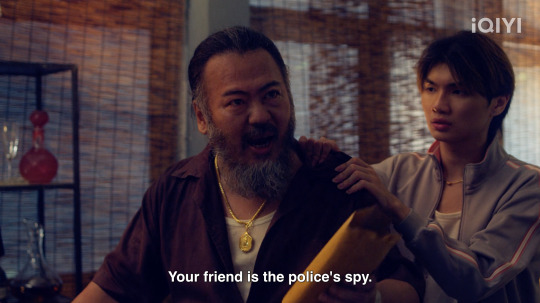
The two reasons he listed are because Non was able to repay the thousands of baht he'd taken from a client... and because he got the case from the police against him dropped.
And who is the reason that Non got that case dropped?
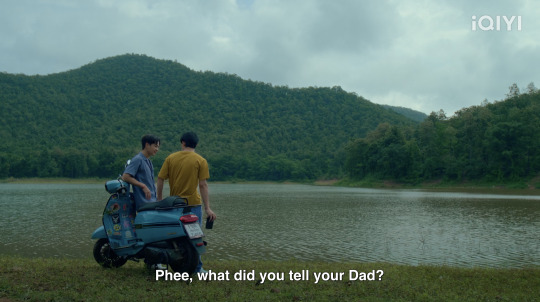

Phee. Phee interfered in the case and implicated himself, making his father drop the case against all of the teens involved. All to protect Non. But in doing that act of protection, Phee actually put Non in more danger...
There's probably something to be read into this. Phee's style of love being all wrong for Non. The two of them making things worse for each other instead of better.
But honestly mostly I just find it tragic... I hope Phee never knows what part he played in Non's disappearance. He likely carries enough guilt from his final words to Non already.
71 notes
·
View notes
Text
Sight vs. Senses: Exploring perception in Only Friends.
Because many people seem to be confused by this scene and don't know how to interpret it or simply classify it as “creepy”, I have decided to share my interpretation of how this scene uses cinematographic techniques and symbolism to influence the visual and general narrative of the series. Let's talk about Top and Mew's relationship, cinematography, visual narrative, symbolism, cinematographic techniques and the difference between vision-based perception and sense-based perception as inherent concepts in Top and Mew's relationship.

1. An introduction to cinematography, narrative and the use of visual metaphors.
Cinematography is a central element when creating movies or series, it can be used creatively to support the narrative and emotions of the story. At the same time, it contributes to create a visual narrative through the choice of camera angles, framing, camera movements and composition of images.
Visual narrative: refers to the way stories are told using primarily visual elements, such as images, composition, colors, symbolism, and camera movements, rather than relying primarily on dialogue or writing. It's about transmitting information, emotions and messages through what is seen on the screen in movies, television series, photographs or any other visual medium.
Visual narrative uses visual elements to convey emotions, themes and meanings that affect the perception of a story. Among the visual elements that are used to enrich the narrative we find visual metaphors.
Visual metaphors are visual elements in a cinematic work that represent abstract concepts, emotions, or themes. These metaphors can be subtle or prominent and are used to enrich the narrative and understanding of the story.
With this concept in mind, we can say that the date in the restaurant is a visual metaphor to address the concept of perception.
Perception is the process by which a person interprets and integrates the sensory information they receive from their environment to form an understanding of the world around them. It involves the ability to take sensory data, such as what you see, hear, smell, touch, or taste, and turn them into meaningful and understandable experiences.
In the restaurant, diners cannot see the food they're consuming until the lights are turned on at the end of the meal. This reflects a lack of literal vision, as they cannot use their sense of sight to identify food. Due to the lack of vision, diners must rely on their other senses, such as taste and smell, to experience food. This scene highlights the importance of trusting feelings and intuitions rather than relying solely on what can be seen with the eyes.

2. Narrative, cinematographic techniques and perception.
Another element that enriches visual narrative and, finally, narrative in general are cinematographic techniques. Visual narrative can use a variety of cinematic and visual techniques to guide the audience through a story, create atmosphere, reveal characters and their emotions, and convey underlying themes or messages. For example, the moment when Top asks Mew to use his senses and the camera focuses on Mew's face is a cinematic technique called “close up” and the following moment when the camera loses focus is a cinematic technique called “generalized blurring”.
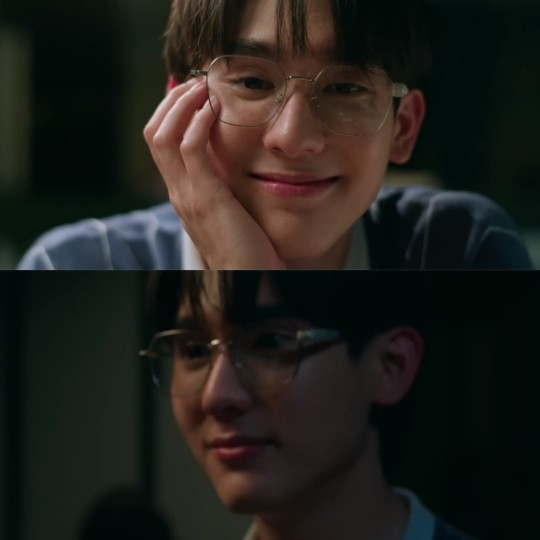
Close up in cinematography and photography refers to the moment in which the camera gets very close to the subject, object or face of a character, filling most of the frame with that element. The main objective of a close up is to highlight details and facial expressions, allowing the viewer to concentrate on those elements with greater clarity and focus.
Generalized blurring in cinematography is a powerful tool in the hands of filmmakers to enrich the visual and emotional experience of a film. In this technique, the entire image is deliberately blurred or out of focus. It's used for various purposes like to set a specific mood in a scene or to represent the emotional or psychological states of the characters, among other uses.
In the restaurant scene, these techniques are used to concentrate on Mew's emotional or psychological state after Top asked him to use his senses and not his sight to perceive the food. Based on these cinematic techniques, we can infer that something important is happening in Mew's mind. In fact, judging by what happens after the scene, we can infer that something very important happened in the restaurant and that meant a change in Mew's attitude. What changed? The way Mew perceives Top.
3. Vision-based perception and sense-based perception.
In EP1, Mew told Top that he knew who was honest (about dating him) because “his sense was always right”. Basically, Mew is able to see people's intentions and, ultimately, their essence through sense-based perception.
Sense-based perception: this form of perception involves all human senses, such as sight, hearing, smell, touch and taste. It's based on the information captured through these senses to form a complete and rich understanding of the environment and people. Sense-based perception can be deeper and more accurate than other types of perception, as it involves multiple sensory modalities.
However, this isn't the type of perception that Mew has been using with Top until now. Mew is usually extra careful and suspicious around Top. His behaviour is usually guided by the mental image (of someone considered promiscuous) he formed of Top based on his immediate appearance. This type of perception is more related to what can be seen immediately and, finally, it's a type of perception related to the use of sight.
Vision-based perception focuses primarily on visual information. This is the most common form of perception in humans and refers to the ability to observe, interpret and understand the world through sight. Visual information is important, but it's often used along other senses to gain a complete understanding. In real life, things aren't what they seem at first glance and what it's seen doesn't always reflect the underlying reality.
An example of how Mew is usually guided by vision-based perception with Top can be found in EP2. When Top tells Mew about his trauma, Mew's immediate reaction is to laugh and not believe it. This is because what Top is telling Mew doesn't correspond to the mental image that Mew has formed of Top. The fact that Top can't sleep alone doesn't correspond to what Mew perceives based on his sight of Top.

Because visual-based perception is limited and must be used along other senses, this type of way of perceiving isn't enough to perceive the complete reality or, in this case, Top's essence.
Mew never stopped perceiving Top based on the apparent, based on the observable. We know this because Mew has never been around Top without his glasses (except in the water sports and shower scene) until EP5, episode in which Mew finally spends time with Top when he has broken glasses. The change in Mew's perception coincides with the episode in which his glasses break, coincidence? No, symbolism.
Mew's glasses: In this context, glasses could represent limited perception or distorted vision of reality.
In EP5, Top asks Mew three times to perceive him based on all his senses. All these times, Mew can't wear his glasses or Top suggests him to stop wearing them.
Situation #1: At the café, Top tells Mew that he wants to be clearly seen (although Mew can see him clearly while wearing his glasses) and recommends him to try a surgery. This time, Top suggests that Mew should stop wearing his glasses so he can perceive his essence/true self, while being guided by his sense-based perception.
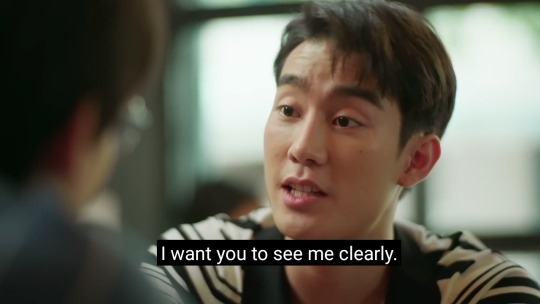
Situation #2: At the restaurant, Top reminds Mew of what he said in the bookstore about sense-based perception and asks him to be guided by it. This is, again, a request to see Top as he really is and not based on a mental image.
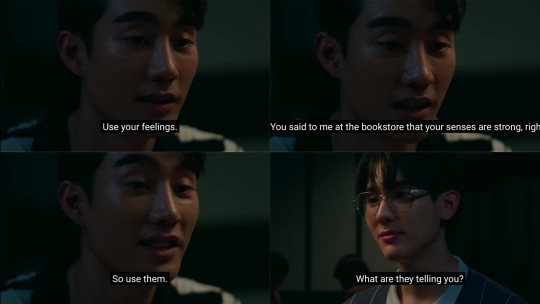
That's why everything becomes blurry, it involves ignoring appearances or what's obvious in front of your eyes. Sense-based perception involves seeing Top's essence (and the affection he truly feels for Mew) and ignoring that which is easily perceptible to vision such as signs of lies. In this case, the generalized blur is a metaphor for saying that love is blind (in a cheesy way).

When Mew starts perceiving Top based on his senses, he loses control and shows how in love he really is with Top. Even all the people who were in the restaurant disappear because Mew and Top are not focusing on what can be perceived by sight, they're focusing on seeing the essence (and the love they feel for each other). This plane isn't on the same plane that the diners are, therefore they disappear.

I guess you can also say that people disappear because Mew is in love and he doesn't care about others, but I'd say it's more than that. It's a matter of perception. It has nothing to do with seeing, it has to do with looking and perceiving the essence of the person in front. It's not a passive activity, it's an active activity that requires collecting information based on all the senses.
No, I don't think it's a dream.
Situation #3: Before Top and Mew have their first time, Mew takes off his glasses and Top asks if he can see him. However, we know Mew can't see clearly without his glasses, so Top is actually asking him if he can perceive him based on his senses (if he can see his intentions and his deep love for him, that's why he keeps telling him that he loves him. He tries to supplant the sense of sight with the sense of listening).

4. The end of vision-based perception.
If we are guided by the idea that Mew's glasses are a symbolism that limits his perception to a vision-based perception, with no glasses Mew will be able to see clearly. Mew will see through Top's lies and that's why in EP5, Mew gets rid of his glasses and discovers Top's infidelity.

As you may have noticed, the restaurant scene is the climax of a topic that has been worked on, in relation to Top and Mew, since the beginning of the series. The restaurant scene marks a milestone in the relationship of both of them and the turning point in the narrative, this thanks to the way in which metaphors and cinematographic techniques shape the narrative. Clearly, this is one of my favorite scenes in the entire series and I think it has a high level of complexity and interpretation.
If you want to read more of my analyses, you can read my Mew analysis here. Stay tuned, I'll do a Ray analysis soon.
#only friends the series#only friends series ep 5#only friends series#only friends#ofts#ofts meta#mew#mew meta#book#top#force#meta#gmmtv#only friend series#thai bl#only friends analysis#topmew#forcebook
187 notes
·
View notes
Text
PromNont - Ep8
Before I get started I was very hesitant to post this one because it’s not as upbeat as my last & I really struggled with how to say what I wanted. This is just my interpretation and it was written without an ounce of sleep so if I missed anything…
We got two scenes for the pairing this time (I need more PromNont) and imma talk about both…
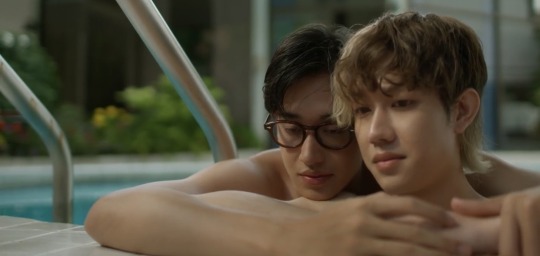

Starting with the pool scene, Nont is finally home having not received any good news but Prom is there to console him as promised - that man is addicted to a back hug and Nont’s shoulder like nobody’s business. It starts off well but for some reason Prom decides to tell Nont that he too cared for Nant. How aftercare was just aftercare for Nant but the best time for him & how there were times he thought Nant may have cared for him too. This of course is the total opposite of when he said that he has no feelings for Nant, that he was simply protective because of their contract. By the time he gets to talking about it wanting to see the video & theorizing that Nant may still be alive, Nont is clearly uncomfortable with just how far the conversation has shifted.
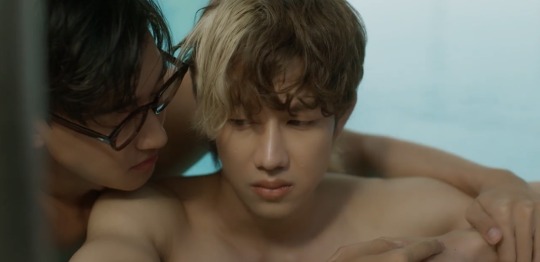
Even though I’ve spoken about Nant being a ghost between them - it wasn’t until the pool scene that I actually became conscious of the fact that the times Nont reinforced that he isn’t Nant has been an ongoing conversation with Prom since his reveal of being a twin - its typically a response to something Prom has said or done and not just a way to erect a wall.
Prom getting jealous / Prom pushing for aftercare / Prom asking him to stay
From Nonts perspective, Prom doing these things is just him using him as a replacement at best or trying to transition him into being Nant at worst, making the “I’m not Nant '' reinforcement necessary. Ever since their first confrontation where Nont accused Prom of having feelings for his twin and told him not to cross the line with him because he is not Nant, they’ve been dancing around the topic. Now there’s a real possibility that Nant is alive and could come home and the things that weren't allowed to be said are being said, there's no more skirting around it. Believing something, thinking it, is totally different from that person saying and confirming it. It makes it real, makes it more painful.
Nant’s existence feels like it eclipse everything because everything around Nont feels like his twin’s. He had to become his twin, he’s living his choices, he’s surrounded by his friends, he’s engaging with his lovers (some more than others) . His value feels tied to being Nant’s twin. When Prom was silently professing a desire to die at the concept of loss - who was that confession really for? As Nont speaks of classic love triangles he’s overtly speaking on Prom / Nant / Nuth & covertly of his own messy relationship with his missing twin’s lover that resides in that shadow as well.
By the time he gets the reactions of the Baddies he’s done. He’s decided there’s no benefit in finding a brother who doesn’t seem to want to be found, a brother he feels he doesn’t even know anymore.
——
The second scene opens up with Nont seducing Prom - uninhibited, bold, & wanton. Like usual Prom seems adept at reading Nont’s mood, everything about him says trouble before he even utters a word.
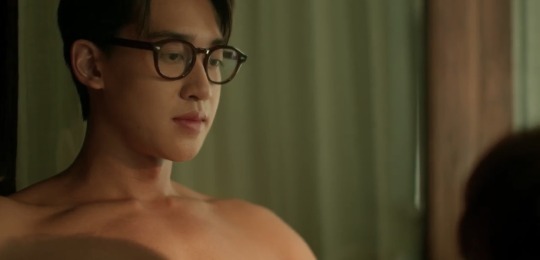
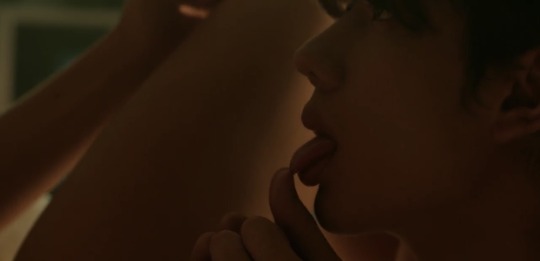
And when he does it’s to tell Prom to have sex with him like he’s Nant, how it’s written in the contract. Nont’s ever constant, “I’m not Nant” becomes “I’m Nant.” However it’s not a response to the will of Prom, instead it’s an ultimatum, almost a challenge and maybe on some levels even a punishment. He tells Prom that if he has sex with him like he’s Nant he’ll continue to look for his twin. Even when Prom doesn’t respond at first they both know it’s a yes. In fact there’s no verbalized response from Prom at all, instead he wraps his arms Nont’s neck and goes to pull him in but Nont pulls back, letting Proms hands slide down his body. It’s clear from the start of this scene til the end of it who is the dominant of the moment, who’s the one with the power.
It’s interesting, Nont started off seductively & then tempting - almost coaxing Prom to go along. But he escalates to an intensity rather quickly. A part of me wonders if he secretly wanted to leave his mark on Prom’s memories of Nant…
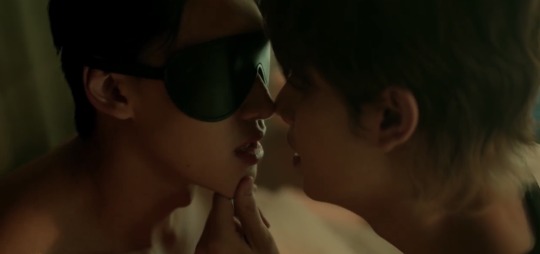
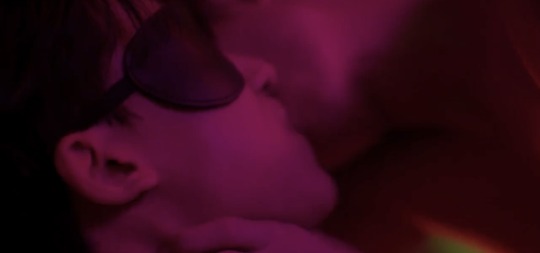
Somehow Prom has agreed to allow himself to be bound, blind folded and at the mercy of Nont’s hands. I cannot decide if he is silly, desperate, or very trusting. Maybe a bit of all three considering we saw Nont admit to being drunk.
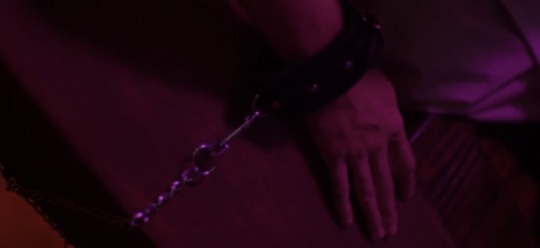
A lot of people heard Nont say, “ Have sex with me like I’m Nant’ but me - I heard him say, “Fuck me like I matter”. Because essentially, I believe that was a big part of it. Yes, there is a bit of anger, bitterness, resentment - which ever word fits best to you - wrapped into this moment but ultimately he wants to feel special, important, cared for. There’s a desire l to lose himself not only in the sex itself but in returning to being the person so many around him seem to yearn for, including Prom, most certainly Prom.
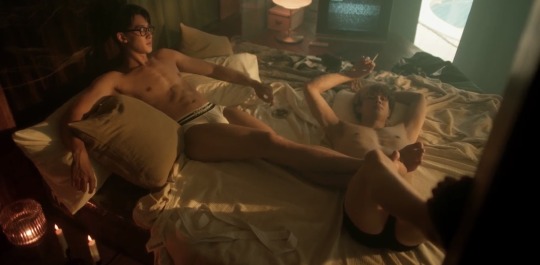
Afterwards they rest with Prom at the head of the bed his feet resting on Nont’s stomach as he lays across the bed. I can’t say if this small bit of physical connection is done consciously or subconsciously. It’s obvious that neither is in a good head space, they’re not in the normal aftercare position Prom seems to favor & when Prom finally ask what Nont’s plans were for finding Nant, Nont responds that Prom must miss Nant badly. Though he may have won the last battle between them, clearly he’s not over it.
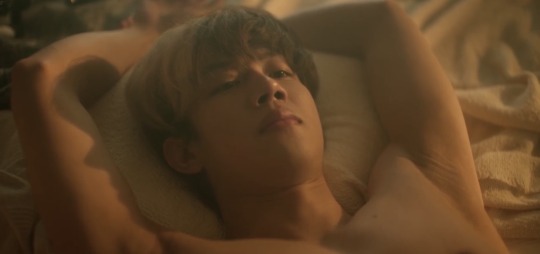
This episode seemed to be a step forward for the majority of the pairings, confirmations, confessions, apologies and forgiveness. It was also a shift for Prom & Nont’s…relationship, although I wouldn’t call it a positive one. Like I was getting at in he post, Prom & Nont have a consistent back and forth that typically goes the exact same way every time however this was the first episode we saw either of them deviate & it created a snowball of a mess that leaves neither of them satisfied by the end.
Note: There was a couple of things that surprised me in this episode - for one I was NOT expecting to see PromNant actually have sex nor did I think it was gonna be so similar to PromNont sex. Nant being a switcher was a big surprise - I thought that would be a difference but it seems they get down in the exact same way. Also was a bit lost when Nont said for them to do it as written in the contract because I knew they weren’t using the terms but I assumed they were still engaging in BDSM…unless the contract entails how exactly Nant gets to Dom / Top.
75 notes
·
View notes
Text
Voyeurism in Playboyy
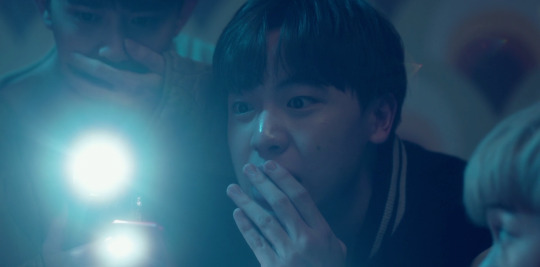
First off, I will preface this by saying I am by no means an expert on film and it’s been years since I’ve written an essay so - uh - take that as you will!
One of the most fascinating elements of Playboyy to me is the overwhelming feeling of being observed. The most obvious way this is achieved is through the use of video. Characters are often recording themselves or other people and those clips are integral to the progression of major story arcs (Captain filming Keen without his consent, the clips of Nant used to investigate his disappearance, etc.) There’s this omnipresent gaze that can’t be hidden from. Someone, somewhere, is always watching. You could be recorded at any moment, your most intimate and personal moments put on display for an unseen audience, and you'd have no idea.

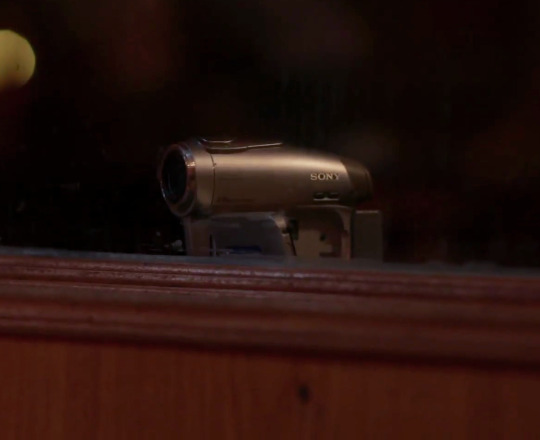
TV screens also play into this sense of being watched. There are often TVs on in the background of scenes. Sometimes they’re being used (Captain showing the video he made with Zouey to the rest of the rugby team, another voyeuristic act) but oftentimes they’re simply showing static (Nont has many scenes like this as do Nont and Prom together). The TV acts as a sort of window into the outside world and, in this case, we're the outsiders looking in. These characters are performing for our entertainment and Playboyy doesn't let you forget that.
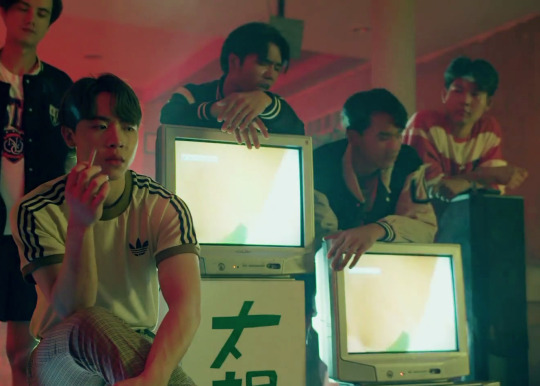

Mirrors are another way that Playboyy heightens this sense of being watched. These are often most utilized with Nont as well. Private moments are being “reflected” back both to the character and the viewer. It's a double dose of being looked at. Twice the attention and judgment.
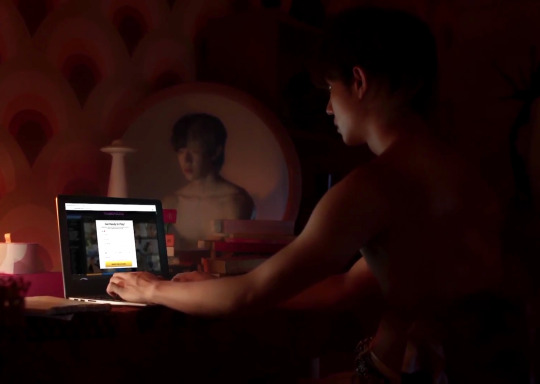
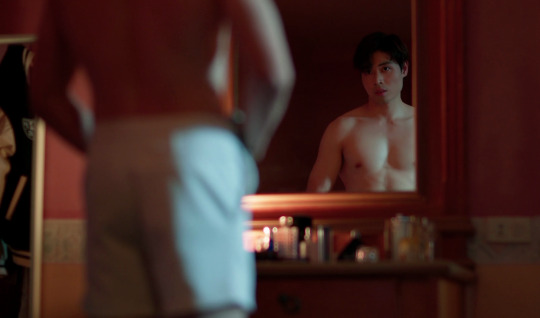
However, what I really want to touch on are the characters’ sense of being observed by us (the audience) thanks to some really neat camera work and breaking of the fourth-wall. We're voyeurs in our own way, another element that Playboyy plays with and draws our attention to (no, I will not be getting into the overarching theme of being surveilled by society because I'd be here all day).
To start, so we’re all on the same page, some basic definitions of voyeurism and the fourth wall.
Voyeurism can be described as “the practice of obtaining sexual gratification from observing others” which fits Playboyy in regards to cam work and the sharing of sexually explicit videos (often without the consent of all involved parties). However, the definition I’m most interested in is “the criminal act of surreptitiously viewing a person without their consent in a place where the person has a reasonable expectation of privacy (such as a home or public bathroom) or of using a device (such as a camera) for the purpose of such viewing.” Merriam-Webster
For fourth wall breaks, this video summarizes things pretty well:
youtube
Okay, with that out of the way, I want to get into how Playboyy utilizes fourth wall breaks and specific camera angles to bring the audience directly into the story and heighten the sense of voyeurism. We are as much a part of the mystery as the characters.
I won’t touch on every single instance of this in the series but a few of my favorite ones (thus far).
In the beginning of episode 2, we have Prom welcoming us to the Playboyy Lounge. The reason I say “us” is because he is addressing the viewer. We aren’t tailing some nameless, faceless person off the street; Prom’s facing the camera and we’re put in the position of a patron. We are the ones participating, looking at the sex workers who are available, being given the rundown. I think it’s a really fun way of establishing the location and preparing us for what’s in store at Playboyy Lounge in the future.
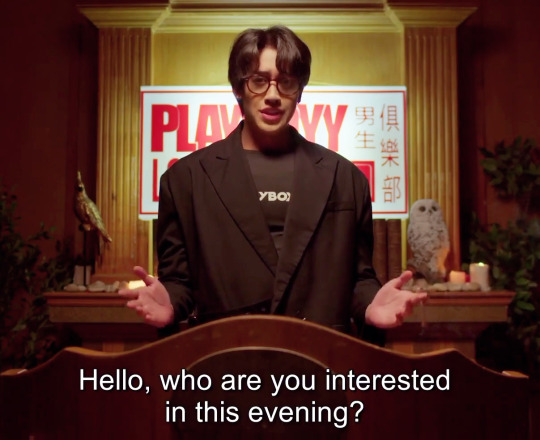
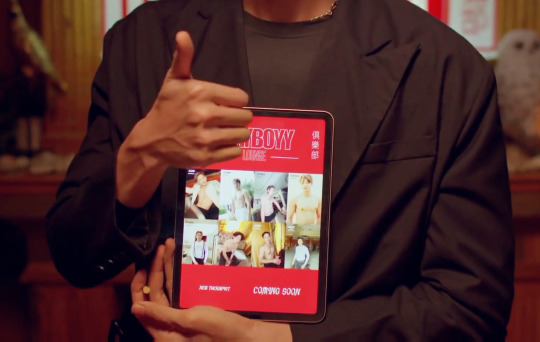
One of my absolute favorite scenes is in episode 6, where the university gang is talking about the best way to get all the suspects together, and the camera is hidden. It’s like the camera has been placed in a closet, left to capture whatever happens behind closed doors. We are given a glimpse into a private conversation that we should not be observing!
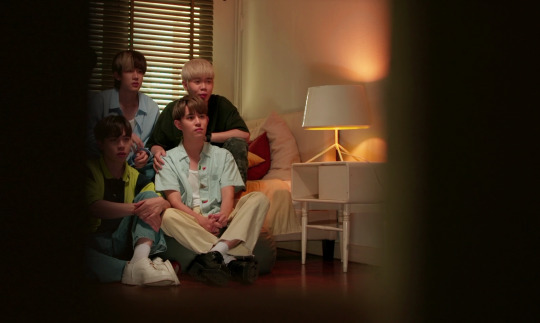
And then, the university boys all turn to the hidden camera - to us - and Nont says this:
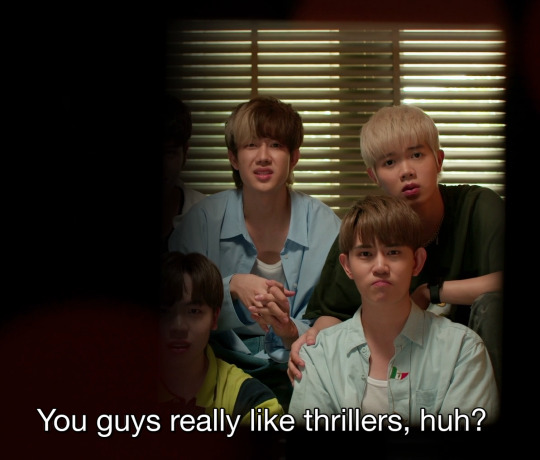
Yes, he’s speaking to his friends but he’s also addressing the audience! We're riding along, anxiously awaiting what will be revealed next, passively watching as these characters go through difficult and terrible things. I think it’s a clever utilization of the fourth wall break that still ties into the show’s presentation overall (the characters, most specifically First, are often remarking about how their life isn’t a specific genre of movie or TV show. That’s another little fourth wall break in and of itself, but I digress).
On to another altered perspective moment that had me screaming: the interrogation scene in episode 12.

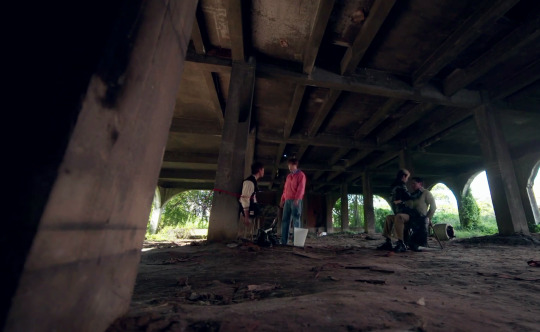
Nont and Captain are executing their half-baked torture plan and the camera is positioned above, lurking. We’re hiding up in the rafters, watching some very illegal activity going on that - again - we are not supposed to be seeing. We're a captive audience to some truly awful behavior but, hey, we shouldn't be here right? We've chosen to follow the story because we want to know what happens. We're voyeurs! There are also moments where the camera is low to the ground and nearest to a column, giving the illusion that we’re hiding. I just really love how these angles add so much extra tension!
The final fourth wall break I want to touch on is the rooftop party in episode 6 (you know, the one we sneakily listened to the planning for?). The uni boys (+Nont lol) do a toast and we’re included! They’re looking directly into the camera and raising their cups to us - we, the audience, are in on the plan and now we’re explicitly being invited to see how it unfolds.

There are more instances (and flavors) of voyeurism and fourth wall breaking but I don’t want this post to get crazy long. (Reiterating that I’m not a professional lol).
I really appreciate all that Playboyy does, not only narratively but stylistically. Each choice that’s made feels deliberate and enhances the story.
60 notes
·
View notes
Text
I just had a mind blown moment thinking about the blood type thing. Cos someone was talking about the fact that O (negative technically) is universal donor and AB (positive) is the universal receiver and it got me thinking about using that concept as a metaphor for affection and love.
Like, Pete is a universal donor. He has the capacity to love anyone, even Vegas who has done some real bad shit to him.
And Vegas is a universal recipient, in the sense of he will take any love he can get because he's so fucking starved for it. (And don't even get me started on how AB is therefore also a limited donor type and how Vegas's upbringing means he can't give love that easily and he has to find the right kind of people - people who perfectly match him - to be able to give them that.)
So that's my contribution to serious analysis. Excuse me while I go back to obsessing over everything else VegasPete that happened this episode.
#kinnporsche#kinnporsche the series#kinnporsche meta#kinnporsche analysis#thai bl#thai series#vegaspete
1K notes
·
View notes
Text
So, Petch and Pie are a fascinating dynamic. We've seen that Petch cares about Pie a great deal this entire time and we know they've had issues in the past with joking about/being assumed to be in a relationship and Pie has rejected all of that. And when Pie starts honestly going after Khim, Petch pulls back.
Their relationship is so, so powerfully expressed in their fencing. They're fighting to figure out what they are in relation to each other, to figure out how much they care.
And when Pie doesn't stop the match when Petch drops his foil, when he still goes for the winning moment, Pie takes that as rejection, as the final refusal of his feelings and his overtures and turns entire to Sun.
While Petch is just starting to process Khim turning his down and his own feelings towards Pie that he's been trying to ignore.
So when their friend says it's like a couple fight... Petch has a lightbulb go off.
But it's too late at that moment, it's too little for him to realize that after Pie's been hurt again and again and rejected so many times.
And it reflects how itself in how Khim sees Sun literally look at someone else and rejects him out of hand to avoid any deeper pain later.
That fear of pain fills both of their relationships but in very different ways. Petch wanted Khim and to get away from being teased about Pie... but Pie's now been rejected by Petch in multiple ways. And Khim keeps pushing Sun away while also caring about him while Sun just keeps trying to find a way around his walls.
And all of this contrasts to Rain and Payu who are in love, who both know they're in love, who know that they want more but are both trapped in their own area of the social contract that prevents them from genuinely acting on their feelings. Neither of them has to push the other away, they're both hurting themselves.
It's a lot of interesting relationships.
#omsn#omsn the series#oh my sunshine night#oh! my sunshine night#thai bl#thai drama#thaibl#thai series#bl drama#bl series#payurain#khimsun#petchpie#piepetch#thai bl analysis
19 notes
·
View notes
Text
I Feel You Linger In the Air
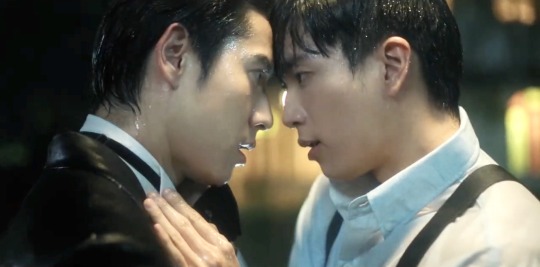
You ready for this?
The quickest of quick thoughts: I loved this show and hated the ending, but not for the reason you think.
This is gonna be one of my big meta beast-sized posts, skip to the end for the final review.
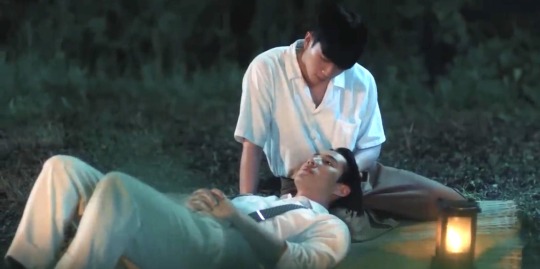
Some Historical Context for I Feel You Linger In The Air - Thailand 1925-1932
I love history and so here's some info that any Thai watcher would likely know, but the rest of us might not... ready?
The Historical Stage:
Burma (now Myanmar) to the west is occupied by the British.
The French hold Vietnam to the east.
Everyone is bickering over what would become Cambodia & Laos.
China occasionally gets involved from the North (also, lots of immigrants from China at this time accounting for a large percentage of the merchant/middle class)
Eventually, Japan would invade during WWII.
In part, The Kingdom of Siam was kept a "neutral" party because none of the surrounding colonial powers wanted to risk offending any of the other players in the area.
Siam re-negotiated sovereignty in 1920 (from USA) and in 1925 (from France & Britain). But during the time of this show (late 1929) it was back to it's customary type-rope balancing act of extreme diplomacy with the allied western colonial powers that surrounded it.
Recognizing that Thailand was never colonized (although it was invaded), it's boarders were constantly nibbled at and it was "ambassador-occupied" off and on by westerners whose military backing and exploitive business concerns simply outmatched the monarchy, especially in the technology department (as well as by reputation on the global stage at the time).
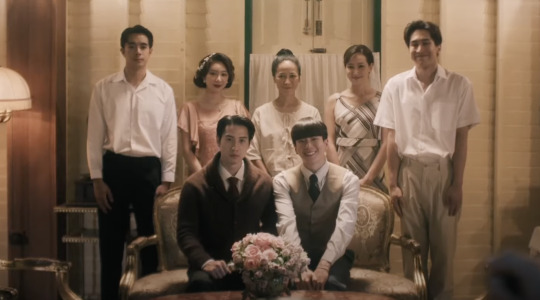
In other words, the farang in this show (James & Robert) were always gonna be both the baddies and the power players of the narrative. (Farang is the Thai word for non-Thai's of European descent, the word means guava.)
The king of Siam at the time (Vajiravudh AKA Rama VI) was initially somewhat popular but also regarded as overly extravagant since Siam had been hit by a major postwar recession in 1919. It should also be noted that King Vajiravudh had no son because he was most likely gay (which at the time did not much concern the Siamese popular opinion, except that it undermined the stability of the monarchy leaving it without an heir).
He "died suddenly" in 1925 (age 44) with the monarchy weakened and succession handed off to his younger brother.
In 1932 a small circle of the rising bourgeoisie (all of whom had studied in Europe, mostly Paris), supported by some military, seized power from the monarchy in a practically nonviolent Siamese Revolution installing a constitutional monarchy. This is mentioned in IFYLITA in the last few episodes but did not (apparently) appear in the original novel.
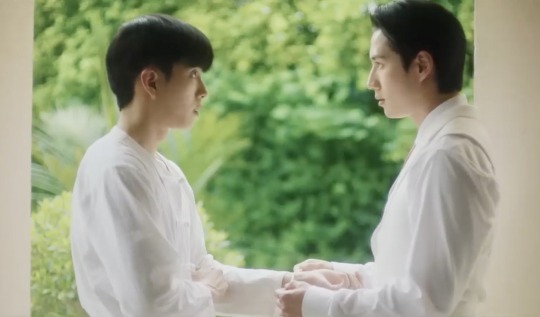
Siam would then go through:
dictatorship,
WWII,
Japanese invasion,
Allied occupation,
democratic elections,
military junta,
the Indochina wars,
communist insurgency,
more democracy and popularization movements,
multiple coups,
more junta,
more monarchy,
eventually leading us to the somewhat chaotic insanity of Thai politics we have today. (Which is, frankly, a mix of monarchy, junta, democracy, egocentric popularism, and bribery.)
The Filming of I Fell You Linger in the Air
The director if this show, Tee Bundit (Hidden Agenda, Step by Step, Lovely Writer, TharnType), has never particularly impressed or offended me as a director. I would have called him simply "workmanlike" in execution: not offensive, serviceable.
So much so that I spent some time hunting for info on IFYLITA's cinematographer (who remains uncredited on MDL) because this one, of all Tee's pantheon, is ultra stylish. It, frankly, felt too good for him.

Specifically, there is a repeated visual motif in intimacy scenes of either Yai or Jom being filmed from behind a screen/drape/curtain making them seem more translucent, like a ghost or spirit. While the other half of the pair is filmed with sharp clarity. In the first half of the series this is more likely to be Yai (an unknown and mysterious element), as the show progresses, it's more likely to be Jom (the person outside of place and time, destined to vanish all together). This cleverly conveys story, tension, and foreshadow (future shadow?)
Occasionally we shift over so they both become obscured and then clear again.
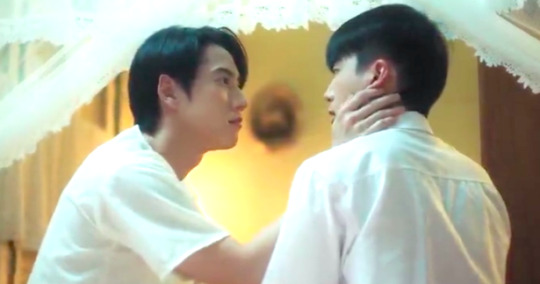
This stylized version of dirty framing and filters is used to foreshadow and then constantly remind us about that Jom slipped (and is slipping) through time and the disconnect that causes to his sense of reality and purpose, and to his burgeoning relationship.
For example, the scene where Yai is drunk and asleep in his bed. The first time Jom is sitting in a chair drawing him. Yai is blurry behind the screen while Jom is solid and sharp.
This filming technique combined with dirty and peekaboo framing is being used to give the watchers the impression of looking at something we maybe shouldn't, like we are being creepy and intruding on their private time. After all, they can see EACH OTHER clearly, it's only us who have the visual impairment.
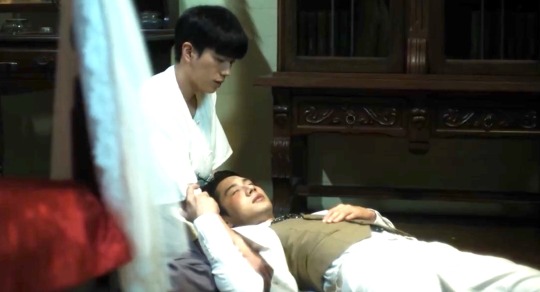
This gives us a sense of doom and discomfort and slight sensation that we shouldn't be there. We shouldn't be watching. But ALSO that we too are outside of time, filtered by the future.
In other words his sense of displacement is being used to trigger ours visually.
It's all quite clever.
It's both beautiful and atmospheric and discomforting and touch stressful. Meaning that it is ALSO a visual vehicle to drive narrative tension. As effective as scary music, perhaps more so in this show (since I personally found the musical motifs and refrains somewhat overused.)

Linguistic corner
The word for reflection and shadow is the same in Thai.
Note on the por/phor/phô honorific in Thai
I have not encountered it before in BL. I am indebted to @embraceyourfandom for the following information;
Phô is a paternal honorific, luang phô is used for respected monks. It basically means father. And is oft seen as male honorific for village elders. It's also used as a male prefix in the names of several occupations like:
พ่อครัว phô khrua (khrúa= kitchen -> chef)
พ่อค้า phô khá (khá= trade -> merchant)
พ่อมด phô mót (mót= person of occult knowledge -> wizard)
พ่อบ้าน phô bân (bân =house -> butler) - most relevant
So, Yai's use is probubly foreshadowing that Jom will be a butler for his house, and is primitively referring to him with this title.
All that said, phô can also be used by a "man who is older/higher on hierarchy to refer to a younger/lower on hierarchy man with intimacy and/or affection."
I think all this has to do with Jom's demonstration of education. Yai figured out early on that one of the reasons Jom doesn't belong and cannot fit in with the servants is that he is more educated than a peasant (of this time period), which for Yai adds up to him being originally from a higher status and possibly wealthy family, especially since Jom speaks English and has travelled (he has a non-northern accent).
There is very little Thai middle class at the beginning of the 1920s since trade is being dominated/dictated by the West, or Chinese merchant operations, and Siam is a monarchy. So for a nationalize Thai citizen educated means military, landed gentry with trade operations (like Yai), royal/political/diplomatic connections, or... none of the above. This changes, especially in the south, throughout this decade (as it did in other parts of the world). So there is a rising bourgeoisie going on in the background but it's not that obvious in Chang Mai at this time.
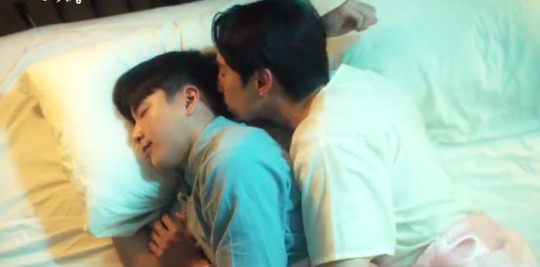
What Jom's educated lack of status means to Yai is that Jom's family either got wiped out or politically disenfranchised possibly as part of the 1912 attempted coups (or even WWI)? This would be mystifying for Yai because Jom doesn't act like he comes from a military family at all. So his background and status is very confusing for Yai, but Yai does know one thing...
Jom is NOT lower class by the standards of Yai's temporal worldview and existence.
For a young man to be educated and yet entirely alone is very dangerous and suspicious. Also, let's be clear, Jom doesn't look or act like a laborer. He red flags "cultured" all over the place.
Yai is paternalistic and caring towards Jom out the gate because Yai has a big ol'crush but also because he recognizes "his own" is trying to survive while isolated and scared.
Yai wants to rescue Jom. Yai is an ineffectual 20 year old gay intellectual. But poor thing sure tries.
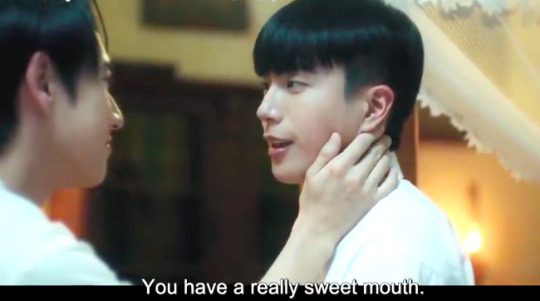

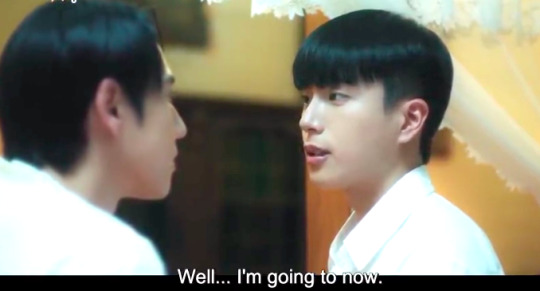
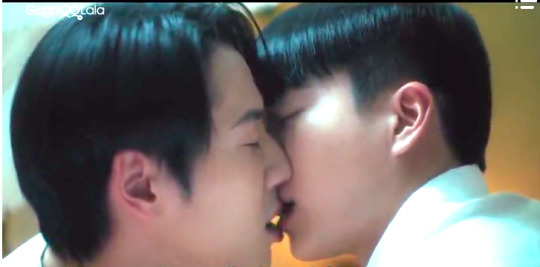
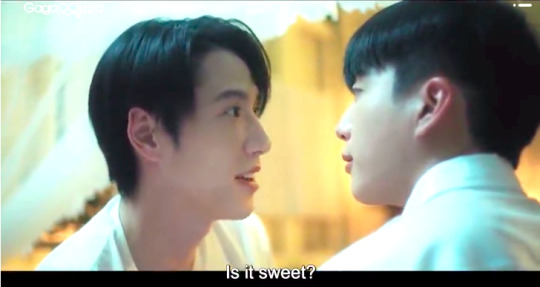
Let's Talk About How I Felt About I Feel You Linger in the Air
The historical aspect was great.
I adore historical romances and we almost never get them in BL. I was always gonna be biased towards this show. (As indeed I am towards Nobleman Ryu's Wedding, Tinted with You, and To Sir With Love.) Aside from some classic Thai BL production issues (less than normal, this is very high production value for Thailand) and my issues around the sound track and repetitive repriens (which frankly were more noticeable because I binged the last half) I have no complaints on that score (heh heh).
The surrounding support cast were all quite good and we even got us some lesbians!
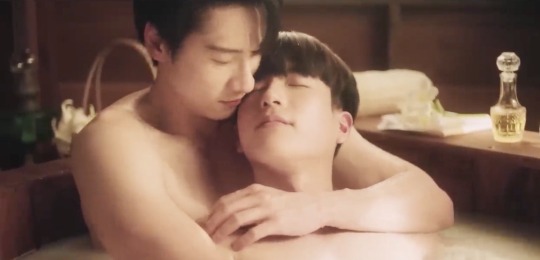
The emotional and narrative tensions were excellent.
Any issues I had with pacing came from focus on characters that didn't interest me, but probubly did interest others. I wasn’t wild or particularly interested in the family drama or the side characters/couples, but they were necessary to make this a fully fleshed story with historical context and to give Yai much needed characterization. Also this use of a ensemble cast is very close to Thailand's lakorn heart, even thought this one had way less scenery chewing ludicrous soapy drama (thank heavens).
I was delighted that external threat, stressors, and conflict drove this plot. That's refreshing in BL.
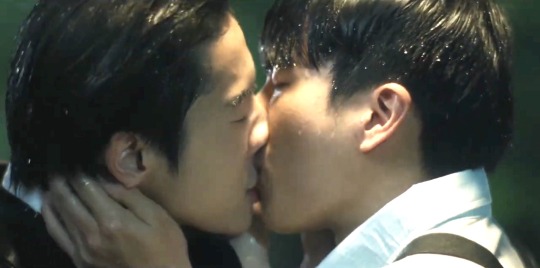
I have no arguments with the chemistry and kisses and sex scenes were tasteful and lovely, occasionally even heart-wrenching, and it's nice to see Thailand especially use physical intimacy to drive plot, and not the other way around.
I love historicals partly because every tiny touch can have such lingering significance, they're very elegant in their chaste physicality. This show didn't need to move into higher heat, but I'm grateful it did because even that was very well done. Thai BLs can often feel clumsy around intimacy, but not this one.
The final sex scene before Jom and Yai separate forever utilizes the ubiquitous director's-favorite-romantic-moments-flashbacks (required of all Asian romance dramas) but with acceleration and tension driven by the noises of sex, which I've never seen/heard done before. In other words: climax of sex = climax of the romance story, I see what you did there, Tee. Clever. Very clever. Bit on the nose… erm… on the… well you know what I mean.
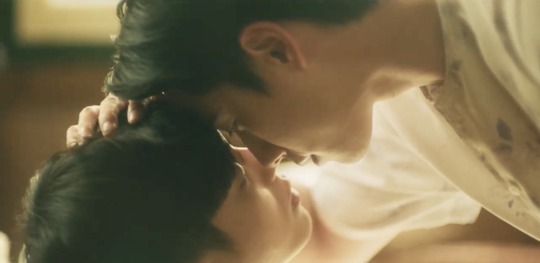
Like all Thai BLs this wasn’t perfect, but for me this is as close as Thai BL gets to high quality romance and that’s what I want the most from my drama watching experience (if not necessarily my Thai BL experience).
But... and you knew the but was coming didn't you?
I absolutely hated the ending.
It wasn't sad, don't worry, but it also wasn't good.
There is a long drawn out separations sequence and then Jom returns to the present, drowning from a car accident. Jom is "rescued" by an moustachioed iteration of Yai from the distant past (who we met once before) and then wakes in hospital. Some time later, Jom returns to the house in Chang Mai where Yai turns up and they reunite.
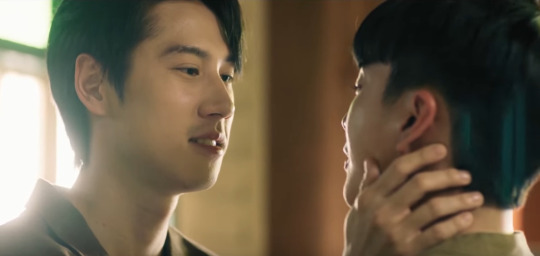
The end.
There is a stinger featuring Jom once more hurled back in time, only further, meeting the warrior mustache Yai once more.
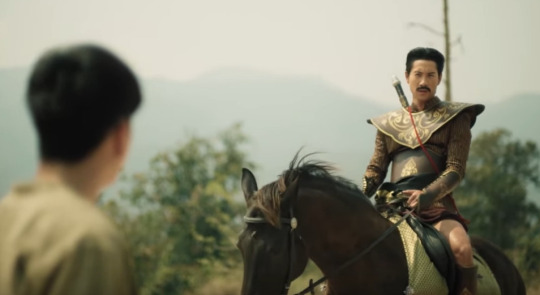
Okay, that's all I knew and all I saw.
Confused? So was I.
If this had been a regular time travel romance: Yai would have been the EMT or doctor attending Jom when he woke up and their "this time period" romance would commence. With either shared memories, or not.
Had this been set up for audience comprehension in line with the original novel, we should have had flashbacks from both Present Yai (he's not the same one, as it turns out) and deep-past Moustache Yai interwoven throughout the series. Preferably with some focus on Present Yai's quest for reunion with Present Jom AND Present Yai's own experience with visions and memory of his past lives.
A full explanation of the ending is here. This explanation of the 3 different Yais makes me like our ending more. But I shouldn't need to read Cliff's notes from some random y-novel reading fan on Tumblr to understand what's going on in a series!
There is supposedly a special happening with Jom + Present Yai.
There was unquestionably a failure in adaptation in the finale of this show.
As a fan and watcher, what I actually felt was deeply confused and hurt.
I also felt that this was a disingenuous un-earned throw away happy ending, since I had no idea who this new Present Yai was and no investment in his character. I simply didn't believe he was the same Yai (Bright is too good an actor, he was clearly a different older personality).
So the fact remains that past Yai, our Yai, the 20 year old boy we grew to understand and love, is abandoned in the past to suffer alone for the rest of his life. And THAT is an unhappy ending for one half of my beloved pair. Yes Jom gets a new Yai in the present day, but it's not the same Yai. They have no developed relationship, and Jom is doomed to leave even this new Yai and slide into the past once more. That's barely even happy for now for Jom's character.
As a result of my deep sadness for 20-year-old Yai in particular, I'm not going to be able to rewatch this show. The whole thing was rendered not just confusing but the opposite of comforting by the final 15 minutes. I'm tempted to dock it two whole points - one for the ending and the other for the lack of rewatch potential.
But the first 11.5 eps were SO GOOD.
This is one of the only times where I am actually hoping for a second season, while simultaneously being wary of the screen writing and production team's capacity to give us a satisfying one.
Industry wise? I honestly don't think we can hope too hard for a full season 2. This was an expensive show with flawed/limited distribution and little sponsorship. I don't see how they'll get funding for a second season. Unless we see this show up on like Netflix or Viki, I urge you not to hope too hard and be disappointed.
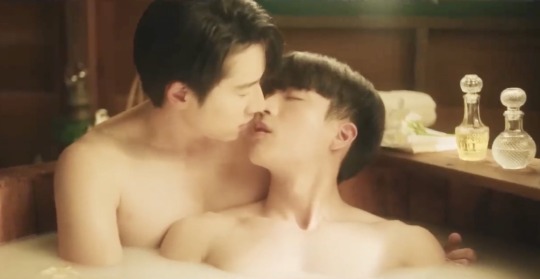
In all honestly?
I started typing up this blog post thinking Thailand was finally, after 5 years, going to earn another 10/10 from me but I just can't in good conscious give it that. It's been days and I'm still upset about that last episode.
And Now My Quick Pitch Review
I truly loved this time travel romance. IFYLITA is an exquisite BL, from filming techniques to narrative framework (much like Until We Meet Again). Steeped in history and family drama it edges into lakorn (but no as much as To Sir With Love and with way less scenery chewing). This is an elegant and classy BL... from Thailand which normally doesn't even try for classy. The main couple (both as a pair and individuals) were excellent, particularly Bright (Yai) whose eye-work acting style is a personal favorite of mine. Pity about the ending. Oh it wasn’t that sad but it wasn’t good either. This show should easily have earned a 10 from me except that it fumbled the… erm… balls. Argh. Whatever. 9/10
(source)
This post is also in My Drama List as a review.
#I Fell You Linger in the Air#Thai BL#BL review#I have LOTS of thoughts#Filming analysis#historical context#lanaguage and lingsuitic use#BrightNonkul#YaiJom#Tee Bundit
137 notes
·
View notes
Text
The Leftover Kids in ONLY FRIENDS
A character analysis of Boston and Ray Ep. 6

This episode reveals a bit more about Boston’s character, and while it doesn’t justify his actions (because your past doesn’t have to justify all your present decisions, especially in fictional characters) we’re able to better understand his impulse to “humble” others when it seems to him like they’re finding their own way.
We learn that Boston’s mother remarried, and flew to another continent to start her new life. And while I don’t want to make assumptions, something about Boston’s politician father (who calls him only to speak about his campaign and winning over young people) encouraging his son’s impulses to toy with the emotions and bodies of others may have had something to do with it. Boston, time and time again tells Nick that the potential of the public finding his sex tapes (with other men) would be a burden to his father’s career. We don’t know if Boston has come out to his father, but the ultimatum that Boston must graduate or be sent back to New York to live with his mom shows his father’s willingness to get rid of a son that may not fit his public image. Boston is a talented photographer and someone in the demographic he wants to target; why so eager to send him away.

In the next scene, while comforting our favorite crazy lovesick puppy, he tells Nick, that the reason he doesn’t make lasting relationships is because he knows he has to leave anyway (and some more be about how he’d be a better photographer abroad). Maybe it’s because of the pressure he feels from his father, but Boston believes that there’s no place for him permanently anywhere. No one has chosen him for an “unconditional forever love” and no ever one will. He’s had no power over that. If my assumption that Boston’s father already knows of his son’s sexuality, and is slowly freezing him out and that Boston knows this already, Boston’s view of his future in Thailand, one that will always be queer, must be bleak. His own father, a popular candidate elect, does not want him. This loss of control triggers him. We see Boston seek control of potential rejection in the way he pursues his flings. He prefers Nick over all his other flings because he’s confident that Nick will always choose him no matter what selfish things he says. He’s envious of Mew who’s constantly chosen and pure, of the perfect Top who rejected him and has his life together, and of Ray and Sands budding relationship. He believes he’ll be left alone again, so he sabotages externally against anyone’s progress.
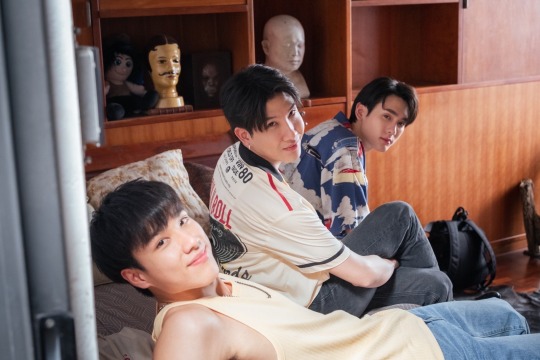
It’s what makes his scenes with Ray that much more interesting. Because Ray is just like him, except he sabotages internally. 
We were introduced to Ray’s family background a few episodes back, and the toll it took on him emotionally, physically, and mentally. His mother was a young and talented actress who married rich, and whose light was dimmed in that marriage. And whether it was resentment over her lost career, Post-partum depression and an uncaring husband, or just a worsening addiction that was left untreated, she died alone drowning herself in alcohol. We know that Ray did not receive much affection from his mother and that his father was just as neglectful. Ray has learned to use money to buy emotions, companionship and intimacy. Unfortunately, he seems to be following in both his parents footsteps. 

There is a theory going around that Boston has had a secret unrequited crush on Ray. And while I don’t think there’s a lot of evidence that supports this ship, it’s a plausible theory. However, the way he constantly goes back to Nick when he needs comfort and conversations, other than just straight sex, says the opposite. I think a better conclusion would be that Boston finds comfort in Ray’s lack of growth and misfortune. After all, they’re very similar. Leftover, abandoned, rich kids that were never chosen. I don’t even think he had any ill intention against Mew when he slept with Top or even with Ray. I think deep down he’s secretly comforted by seeing Ray heartbroken. It makes sense that he was triggered when he saw that Ray might have found someone to help him come out of that misery. He doesn’t provoke Mew or Top the way he does Ray. Maybe it’s because Ray doesn’t see how similar they are. Maybe it’s because Top and Mew see right through him. 
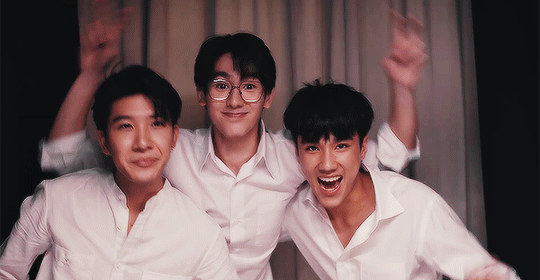
Mew’s role in their friendship is also really interesting 🤔. Ep. 7 might give us inside Mew’s thoughts and actions. Is Mew manipulating his rich friends to get his dream career and partner or is it all all a grand plan to help heal the lives of the people he cares about most.
Overall, I love how real the show feels. The discussions of drugs in Thailand’s queer community, of privilege and class struggle, it all feels incredibly genuine. It’s hot and steamy and we’ll written. Like we CAN have all of these things at once! The growth that I see in BL/Queer (the slash is necessary) content gives me hope. Please give the lesbians (AprilNamchueam) more screen time plsssssssss 😩.
(Please excuse any typos and errors.)
#only friends meta#only friends ray#only friends the series#show analysis#first kanaphan#khaotung thanawat#firstkhao#only friends boston#Only friends episode 6#thai bl#gmmtv 2023#gmmtv bl#gmmtv#bostonnick#neomark#queer#messy gays#queer friend groups#someone give the lesbians more screen time#namchueam#AprilNamchueam#jennie panhan#forcebook#lgbt representation#lgbtqiia+#thai gl#thai drama#only friends mew#only friends top#only friends sand
87 notes
·
View notes
Text
Reflections in Last Twilight
Alright, I was not really planning on writing analysis on for Last Twilight, at least not this early in the game. But my dearly beloved @dribs-and-drabbles has called to me like Beetlejuice to analyze the use of reflections in this show. Which means i have been summoned, which means, it is time to bust out the meta.
Now, having just looked back through both Episode 1 and Episode 2, there have not been that many instances of reflections in Last Twilight so far, though the ones we have had already are definitely memorable. So let’s get in to it.
Episode 1
Intro Sequence
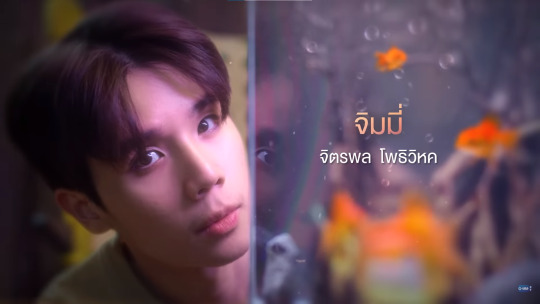
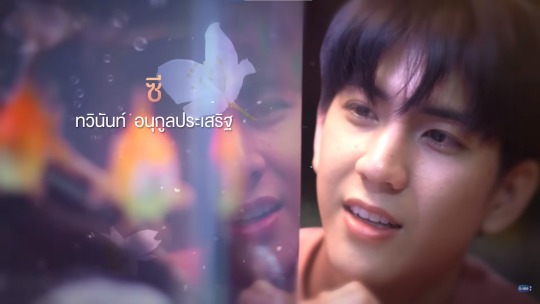
I’m not going to talk about the reflections off the fish tank here because the actual scene they are tied to comes in Episode 2 and I think there will be a whole lot more to say then. But I do want to acknowledge that we will be getting reflections at the beginning of every episode, and that Aof is already establishing the important symbolism of fish and jasmine.
The first actual reflection we get in Last Twilight comes in the form of Mhok in the side mirror of his sister Rung’s car.
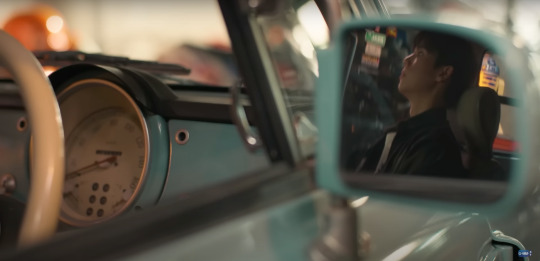
Rung's car has been sitting in Pae's garage for a year at this point. It would be gathering dust if Pae hadn't spent time over the course of that year meticulously maintaining her vehicle. In fact, that is the very first thing we see happen in this workshop. Pae taking car of Rung's car in her and Mhok's sted. Taking care of this car was not his job, we can assume that he did not anticipate the time commitment that would come with maintaining possession of Rung's car while Mhok was in jail, but he has set himself up to task and gone, in my opinion, above and beyond what was expected of him by continuing to maintain her car.
Pae is surprised when Mhok hands him the spare key and says Pae can sell the car. Mhok at this point is in the anger stage of grief. He blames Rung for her death, and wants to absolve himself of the grief and guilt by maintaining the idea that Rung was to blame and to try to rid himself of any and all reminders of his sister. Mhok, as we know, is incredibly alone. His mother died when they were young, his sister has died, he is no longer associated with his friends/coworkers from his old shop after they all got arrested, and he hides as much as he can from Pae. Mhok has Phorjai and Phorjai only as any sort of support system, and she's his ex-girlfriend, so I don't think we need to go too in depth to acknowledge the complications there.
Mhok wants to forget his grief, his pain, and I appreciate greatly that Pae won't let him do that. That Pae knows Mhok enough to understand that the second that Pae sells that car, Mhok is going to regret letting it go. So he extends another six months grace period to let Mhok actually think it over. Mhok looks over the car, at the bandaid that Rung put on the little scratch she got her first day owning the car, in the glove compartment where all the handouts for her failed budiness are. And Pae allows Mhok a minute alone, in the dark of his sister's car.
At which point we get the reflection. Now, personally I think Jimmy has some work to do as an actor, which means it feels harder for me to accurately read Mhok's face/emotional state. But, for me, here, Mhok looks *tired*, but most importantly, he is trapped in the frame of the side mirror, he is stuck in the dark, and he is alone. In just one small frame, Aof is showing us the aspects of Mhok's character that will help him recognize himself in Day, and tell us why Mhok needs the relationship he has (or will have) to Day.
This is the only actual reflection we see in Episode 1.
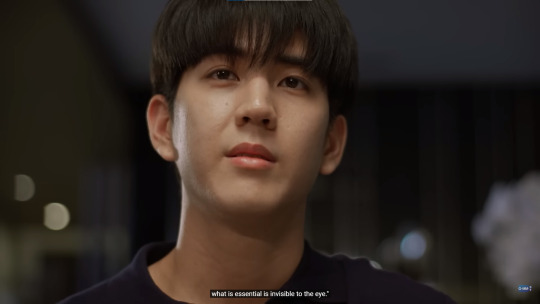
But I do want to comment on the end of the episode, like everyone else has, about part of the *The Little Prince* reading that Mhok does at the end. Namely the line "what is essential is invisible to the eye".
I don't think, in a show with going blind as a part of its central theme that we really *need* to look deeper in to the significance/meaning of this line. But because I have been asked to talk about reflections, I want to go a little overboard on the line reading here. Because, day to day we can't see ourselves, right? We wouldn't know exactly what we look like if we couldn't look in to a mirror. Mirrors, reflections, are often a subject of insecurity, providing us the opportunity to pick at every flaw. In mirrors, dancers can watch and correct themselves, their body positions, tweak their choreography based on what they see that they normally would not be able to. Actors can practice facial expressions in the mirror, figure out how they have to hold themselves to make their emotions believable. In horror movies, mirrors show us what lurks in the background, in spy movies it shows us what exists around the corner. And in our deepest moments of guilt or shame, facing ourselves in the mirror becomes a challenge.
I don't want to get too ahead of myself on predictions about this show and what Aof is planning on doing with it, but personally I think the use of mirrors/reflections is a perfect way to show what is essential and invisible to the eye. Mhok is not looking at himself in the mirror here, and if we were standing in the room with him, we would not be able to see his face at all. But the side mirror of Rung's car allows us to see what Mhok is thinking and feeling. But he isn't looking in the mirror himself. He isn't and hasn't started facing or confronting his own grief, isolation, or pain. I don't know that Mhok is as of yet capable of seeing what he needs to change in his own life, because he hasn't reflected on his own life.
Episode 2
The first "reflection" we get in Episode 2 is not really a reflection, at least in the traditional sense, but I do still want to talk about it. I am of course talking about the selfie with Aon.

Mostly because I wanted to acknowledge that to me, a photo is a kind of reflection in that you can both look back at yourself and also reflect on the memory of the time. To be honest, I don’t know exactly how I feel about Aon taking this picture of Mhok, because he takes it for the Society for the Blind. But how are they using it? Is this evidence that Mhok is here and doing what he said he will, or is this going to be used in marketing of some sort? Either way, it is capturing a moment in time that Mhok could one day look back on to reminisce about the beginning of his relationship with Day.
And here Mhok is with someone else, a second person to accompany him where before he just had himself. But this is fake, this is quick, this is right after Mhok has just been shut out of all proceedings between Aon and Day. Mhok doesn’t know what’s happening before he is being told to smile for the camera. And if anyone were to see this photo, they would see a very happy Aon and a decently confused Mhok, but they would have no idea how limited a connection to Aon, Mhok would have had at this point.
The next reflection is a bit difficult to see, but it comes during the conversation Day has with Mhok about the eye drops, where he explains he can see more clearly right after he uses them. In this scene, Day is talking to Mhok while keeping his gaze affixed to the lone goldfish in his increasingly grimier tank.
Mhok and Day have a brief conversation about whether or not the fish is lonely since it is the only one in the tank, and Day brushes it off by saying that goldfish have short memory and that it couldn’t possibly be lonely.
But, whenever we see Day on screen here, we see his reflection in the glass of the tank. And there are a few great moments during this conversation where the goldfish sits directly in front of Day’s reflection. To me it feels like a memory, a ghost, or a projection, and we know by the end of Episode 2, (if we haven’t picked up on it already from the title sequence or how heavily goldfish imagery has features in the promotional material for this show) that the goldfish is a stand in for Day himself.
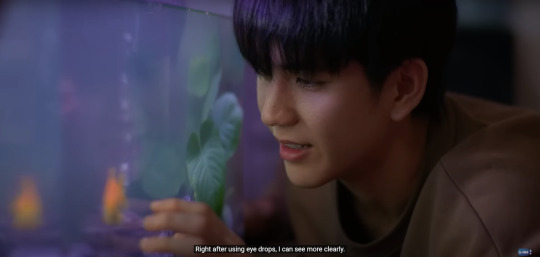
So I love the fact that we get this wisp of an image of Day’s face in the tank, like he’s trapped inside of it. Because we know that in a way he is. And the other thing I love about this, or rather about the fact that this goldfish is meant to symbolize Day himself, is that watching this goldfish is what brings Day the most joy at the moment.
I love that because it shows me that there is hope and joy still left in Day, if he can just take the time to look at himself a little differently.
OKAY it’s time for the Big Boys.
Our first instance of an actual reflection off a mirror in Episode 2 happens when Mhok is trying to check in with Day after Day runs away from Night’s friends. Mhok has said that he understands Day, and Day Does Not Like That™.
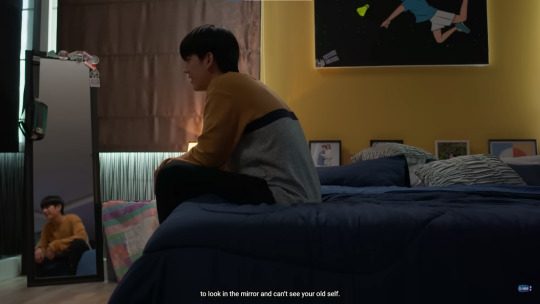
Day’s response to Mhok’s monologue is to say that Mhok has no idea what it is like to look in the mirror and not see your old self. And of course, we see Day’s reflection in his full body mirror. Now, again, Aof is being pretty heavy handed with his metaphors here. But that doesn’t mean I don’t absolutely love the double meaning of these words. Day is going blind so he literally can’t see himself in the mirror anymore.
But also, Day is deep in his grief for the things he has lost. His freedom, his career, his confidence that I think he has morphed in to a completely different person. One who is bitter, and self-conscious, and more comfortable hiding away where he can wallow in misery over his condition and not have to confront the new world he is living in. Day is running from connection, I mean not a minute before this scene Day legitimately ran away from Night’s friends rather than have to explain his blindness.

The scene continues, and Day shuts himself off even further from the world around him, by putting in his headphones. Now he can drown out Mhok’s attempts to comfort him, but in the long run what is that going to do? As @shortpplfedup said to me earlier “the set dressers did not come to play” when it came to designing Day’s room. When the curtains aren’t drawn there is so much natural light in Day’s room. His walls are bright and colorful, there are photos and awards all over the place. Day’s room has so much personality in it, so much life within it. But the mirror shows nothing. It shows Day alone, surrounded by blank walls in grayscale.
The costume designer made an excellent choice of shirt for this scene, by the way. Because the yellow blends in enough with the wall in Day’s room, that (especially) when coupled with the camera’s focus in this scene. The real Day almost fades in to the background, and your eye is naturally drawn to this spot of yellow in the mirror.
The mirror highlights his isolation while at the same time showing the audience how much Day can and does stand out.
AND it parallels the reflection of Mhok in Episode 1 so well, not just in the emotions that we see from Mhok and Day, but in the sense that Mhok’s reflection is in Rung’s car because he is currently trapping himself in the darker, meaner thoughts about his sister, rather than processing his grief. While Day’s reflection is in his room because he is currently trapping himself in the darker, meaner thoughts about himself, rather than giving himself enough compassion to start moving forward.
When Day does not respond to Mhok’s conversation, Mhok is triggered at the thought of his sister’s death and he breaks down the door to make sure Day is okay, and gets fired for it. Mhok does not argue, he does not put up a fight, he does not try to explain, he just honors Day’s request and gets the fuck out. And I love the way that Mhok is already starting to change Day’s outlook. Because we see how mopey Day is after Mhok leaves, and how much hope there is in him when Night tells him there is someone at the door who wants to see him and he so obviously thinks it’s Mhok.
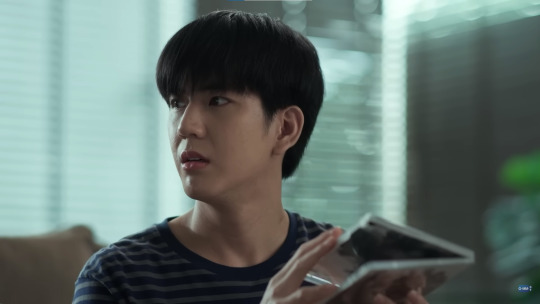
Mhok gives him the gift of the fish slippers, and Day goes to visit Mhok at the market, only to find out that Mhok has spent time reflecting on what Day told him about not understanding him, and making a fool out of himself in the eyes of the other market patrons by blindfolding himself.
Mhok is doing what no one else has really done and is making a concerted effort to truly understand where Day is coming from, the fears that he is carrying, and the challenges he faces as a blind man.
But of course, we know by now that while there are definitely things Mhok is had not or might never understand about the physical realities of Day’s life, he can understand loneliness, and he can understand rage, pain, and anger. There are parts of himself that have grown within him over the past year that recognizes parts of Day that have grown within him over the past year.
And we have already been seeing the impact of Mhok on Day’s life, in the fact that Day has smiled more, Day has left his room, Day has eaten at the table, and agreed to watch a movie. And that singular day where Day did not wallow in his own misery, but left his room, went out in the sun, etc stuck with him because he is in the living room watching a movie the day Phorjai comes to visit.
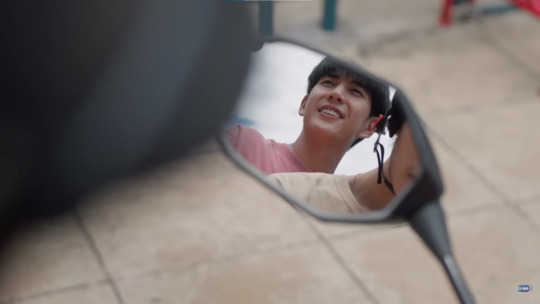
Culminating in the second real reflection of Episode 2, where Mhok, via the side mirror, sees Day smiling on the back of his scooter. And what I love about this moment is that the focus is entirely on Day. I don’t want Last Twilight to strip Day’s healing processes from him and give them to Mhok. I think it is totally fine for Mhok to contribute to Day’s increasing happiness, but ultimately I want Day to have enough autonomy in this narrative that these decisions that lead to him enjoying his life again are primarily comprised of Day’s own choices. And I think that we can get something visually from that by the fact that we don’t see a lot of Mhok in this reflection, only one small portion of his chin.
Day made the choice to have Phorjai take him to see Mhok, Day made the choice to rehire Mhok, and Day is the one having a moment on the back of this scooter just reveling in the feeling of the wind on his face. I love that this reflection shows just enough of Mhok to show that Day is not alone, while still putting all of the attention in the reflection on to Day and the joy he is feeling.
The idea that Day is no longer alone is reinforced after Mhok makes a pit stop to purchase a companion for the goldfish in Day’s room. And again we get in to some of my favorite instances of reflection in Last Twilight, where we place the boys’ reflections in the fish tank.

And this is where the images from the intro sequence come from. Day looking at Day Noi and Big Mhok interacting with each other in the tank. Here we still have Day alone in the reflection, with the goldfish tying him to this symbolism. But Day’s reflection is so much clearer now that the tank has been cleaned. Now Day’s reflection in the water tank is far more obvious, and hey, since it’s me, I’ll overanalyze this moment to say that as Day has gotten to know Mhok a bit and has started venturing outside of his room more, that Day is getting a clearer vision of himself as a person. Regardless, we as the audience can see Day’s reflection in the tank all the more clearly and that reflection is vibrant and bright, because Day is becoming more vibrant and bright.
“No More Loneliness Little Day” Mhok says and we get MY FAVORITE SHOT OF THE SHOW THUS FAR
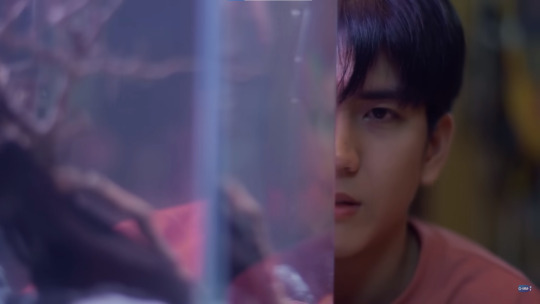
The split screen. It’s not even a reflection, but I am talking about it here, because I think the absence of reflection is just as important as its presence, and I love that we have this moment where half of Day’s face is crystal clear and the other half is completely obscured. There is no trace of it. Considering how much Aof has been turning the camera on Day’s vision, we aren’t that far off of what Day sees in this shot. I like that this image has Day straddling these two worlds.
And we get the final reflection of Episode 2, Mhok’s face in the fish tank.
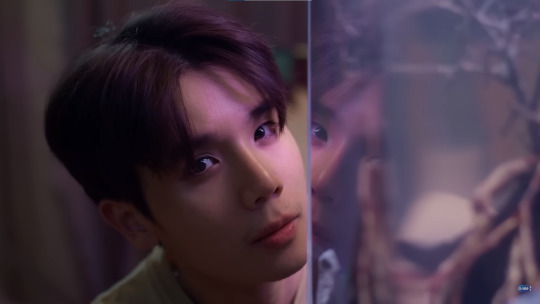
Again, I don’t even know that this is really intentional or it is just the way the reflection happened to have occurred, but I love the fact that not all of Mhok’s face is present within the fish tank. I like that Mhok is slowly encroaching on Day’s space, that Mhok is slowly starting to appear in the parts of Day’s life that Day actually cares about. Mhok is lonely and Day is lonely, and they have finally found someone they might be able to connect to. Big Mhok is there for Day Noi and Mhok is there for Day.
I love that while the fish themselves are able to cross those barriers and that we get to see the fish swimming up and next to each other, that we have yet to see Mhok and Day’s reflections fully together. Even here, Mhok’s reflection in the fish tank is alone, just like Day’s reflection in the fish tank was alone. But they are in the same place, they are in the same room, they are in the same tank, they are in the same stage of their grief (anger) and there is no way in hell we don’t get one or more reflections in the mirror or in the fish tank by the end of this show where Mhok and Day are both fully present.
#last twilight#last twilight the series#last twilight analysis#jimmysea#mhokday#mhok x day#aof noppharnach#gmmtv#thai bl
106 notes
·
View notes